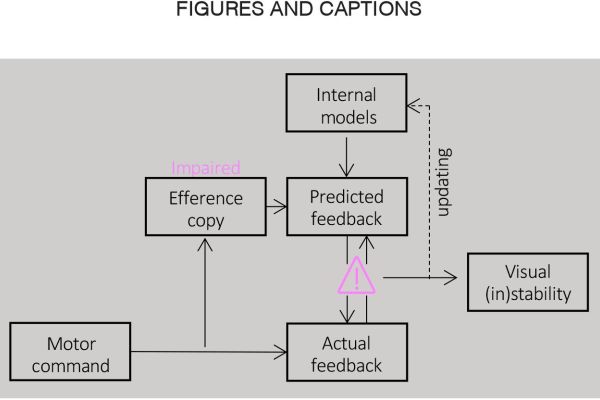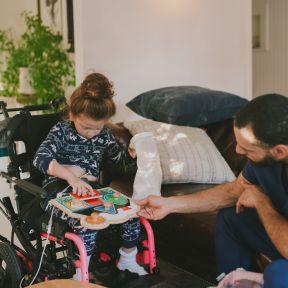- Back issues

Home » Autism Behavioral Solutions » Autistic Child Refuses To Do Anything? Here’s How to Help

Autistic Child Refuses To Do Anything? Here’s How to Help
By Jeremy Brown
March 22, 2024
As parents, it can be very difficult to get your children to do something you ask them to do. When you add in an autism spectrum disorder diagnosis, that difficulty tends to skyrocket. This can create problems both at school and at home. So, what do you do when your autistic child refuses to do anything you ask?
Let’s look at the challenges caused by autistic children refusing to do anything. What might cause these challenges, and what are some ways to encourage the child to do what is asked and required of them?
Download your FREE guide on
Autism Behavior Interventions
Reasons why an autistic child might refuse to do something
Why does your autistic child refuse to do anything? That may be difficult to determine, but it will be harder to get them to agree to do something if you don’t understand the reasoning behind the refusal.
There are several potential causes for this behavior. They include:
- sensory overload ,
- communication issues,
- social challenges,
- and difficulty transitioning from one task to another.
From personal experience, my children with autism have often refused to do an activity due to sensory challenges and anxiety issues. My older son gets anxious eating around new people. His refusal to eat would eventually lead to stomach pains related to hunger later in the day and sometimes sickness.
My younger son refuses to enter a public bathroom. He has auditory sensory issues , and the echoes in public bathrooms can become too much for him, especially if someone uses the automatic hand dryer. But knowing these causes has made it easier to address the refusal and get both of my sons to do things asked of them.
What can you do to manage these behaviors?
While it’s certainly difficult to deal with an autistic child who refuses to do anything, there are things every parent can do to encourage their children with autism to take part in activities. Each child will require a unique approach, and patience is necessary. There are some tips to help.
1. Incorporate special interests
If your child has something that interests them, incorporate it to get them to do something. Some kids may love a certain television show. For example, if there are cookbooks based on that television show, you could use them to make a special meal with your child. This can help them overcome their anxiety about eating because they want to try the dish that’s connected to their favorite television show.
In the school environment, teachers can use your child’s special interests to help encourage them to take part in preferred activities. This may lead to an increase in schoolwork completed and fewer disciplinary instances at your child’s school.
2. Use visual supports
Visual support can go a long way in helping autistic kids who may have trouble transitioning from one task to another. These supports can include schedules, task lists, and social stories . Autistic children can see what is expected of them and when allowing them to process what they are being asked to do.
My wife and I used a visual timetable to help encourage my son with his chores at home. He could visually see our expectations and understood the possibilities for rewards for good behavior or clear consequences for not listening.
He was still a kid, so it didn’t always work, but it was effective in encouraging him to clean his room. These supports also serve as a communication skills enhancer for some autistic kids.
They allowed him to see his chores in a more meaningful way. He was able to break the tasks up rather than becoming overwhelmed with all he had to do.
3. Create a supportive environment
Many autistic children tend to thrive in a more structured environment. Routine changes and spontaneity don’t always work for those with autism spectrum disorders. It’s up to parents to create a supportive environment at home and teachers to create one at the child’s school.
If an environment is too loud or too bright, it can take a toll on the child’s mental health and lead to them refusing to do certain activities.
Parents and teachers can recognize sensory challenges that may be causing problems for the child and address them. Once the environment is supportive, the autistic child is more likely to respond to requests for certain activities.
4. Work on social skills
Autistic children who struggle with social skills may not be motivated to engage in activities at home, out and about, or in school. Working with your child can improve their motivation and lead to them wanting to take part in certain activities.
Parents can promote social skills improvements through things like structured playdates and the use of social stories. These strategies can improve social situations, give the child a sense of support, and reduce anxiety levels.
5. Give them a choice
A child is more likely to take part in an activity if they are interested in it. While it may not be easy to get them interested, giving them a choice over which activity is performed can lead to more motivation to complete it.
Offering options allows for a sense of control even if both tasks have to be performed. Kids will often pay more attention when expected tasks are presented as a choice.
Each child is different, so the choices have to be presented to each child differently. Parents and teachers need to present them in a way that allows the child to keep their focus on the choices and feel support and understanding from adults.
Just putting the options in front of them can lead to them feeling overwhelmed and create other issues.
6. Seek professional help
If children with autism spectrum disorder continue to struggle with requests to do certain activities, parents can and should know they are not alone.
Reach out to a professional for help. The child may need an official diagnosis of pathological demand avoidance , a condition connected to autism where the child has an obsessive need to resist demands or requests.
If a child suffers from pathological demand avoidance, it can take a toll on the emotional well-being of the autistic child, the parents, or a teacher trying to help the child. Professionals can help you remain calm and work on strategies to help your kids without feeling frustrated.
7. Be patient
This is the only advice with autistic children I’ve ever experienced to be universal. You can’t rush anything. Some children may require more time to process information. Other children may struggle with communication skills. Still, others may just need time to adjust to changes.
For many children, rushing them can lead to self-confidence issues, feelings of frustration, and a lack of understanding. These can also contribute to outbursts of emotions that cause meltdowns or other troubles. Practice specific strategies and use them repetitively to help everyone remain calm.
Patience and understanding lead the way
Some autistic children will refuse to take part in activities you want, need, or ask them to do. It can be difficult, but there are ways to encourage and foster their participation.
Parents can find out why autistic children are refusing to cooperate and adjust the environment to make it work better. Be patient and understanding to help continue fostering receptive behaviors among autistic children.
Q: Why is my child with autism refusing to cooperate?
A: Autistic people can refuse to cooperate for a variety of reasons. Some of them include sensory overload, routine changes, difficulty processing emotions, and struggles to understand social cues.
Q: How do you deal with an autistic refusal?
A: Parents should remain patient when experiencing autism refusal from their children. They should also pause between words and use repetitive phrases to help the child process the request. Clear communication, along with a specialized request, can help change a child’s mind when they are refusing to do anything.
Q: Is stubbornness linked to autism?
A: Many autistic people also experience bouts of stubbornness. Research has found sensory connections and links between autism and stubbornness .
Q: How do you deal with an angry autistic child?
A: When an autistic child is angry, parents have to find a way to help them calm down. Some ways to address this include clear communication, structure, identifying emotional or sensory triggers, and offering an alternative solution.
References:
Michelle Grenier & Pat Yeaton (2019) Social Thinking Skills and Cooperative Learning for Students with Autism, Journal of Physical Education, Recreation & Dance, 90:3, 18-21
Kaartinen, M., Puura, K., Pispa, P., Helminen, M., Salmelin, R., Pelkonen, E., Juujärvi, P., Kessler, E. B., & Skuse, D. H. (2019). Associations between cooperation, reactive aggression and social impairments among boys with autism spectrum disorder. Autism, 23(1), 154-166
Munkhaugen, E. K., Torske, T., Gjevik, E., Nærland, T., Pripp, A. H., & Diseth, T. H. (2019). Individual characteristics of students with autism spectrum disorders and school refusal behavior. Autism, 23(2), 413-423
Support Autism Parenting Magazine
We hope you enjoyed this article. In order to support us to create more helpful information like this, please consider purchasing a subscription to Autism Parenting Magazine.
Download our FREE guide on the best Autism Resources for Parents
Where shall we send the PDF?
Enter you email address below to download your FREE guide & receive top autism parenting tips direct to your inbox
Privacy Policy
Related Articles
Biting Nails in Autism: Causes and Management
Autism and humming: understanding vocal stims, autism and puberty aggression: what you need to know, baby hair-pulling and autism: causes and management, managing separation anxiety in autistic children, autism elopement: causes, risks, and prevention, a child with autism still wears diapers here’s what to do, autistic child favors one parent here’s why, covering ears and autism: understanding sensory sensitivities, why do autistic people talk to themselves, why do children with autism like spinning around in circles, autism and paranoia: is there a connection, privacy overview.
| Cookie | Duration | Description |
|---|---|---|
| cookielawinfo-checbox-analytics | 11 months | This cookie is set by GDPR Cookie Consent plugin. The cookie is used to store the user consent for the cookies in the category "Analytics". |
| cookielawinfo-checbox-functional | 11 months | The cookie is set by GDPR cookie consent to record the user consent for the cookies in the category "Functional". |
| cookielawinfo-checbox-others | 11 months | This cookie is set by GDPR Cookie Consent plugin. The cookie is used to store the user consent for the cookies in the category "Other. |
| cookielawinfo-checkbox-necessary | 11 months | This cookie is set by GDPR Cookie Consent plugin. The cookies is used to store the user consent for the cookies in the category "Necessary". |
| cookielawinfo-checkbox-performance | 11 months | This cookie is set by GDPR Cookie Consent plugin. The cookie is used to store the user consent for the cookies in the category "Performance". |
| viewed_cookie_policy | 11 months | The cookie is set by the GDPR Cookie Consent plugin and is used to store whether or not user has consented to the use of cookies. It does not store any personal data. By using this website, you consent to the use of this cookie as described above. You can manage your cookie preferences and withdraw your consent at any time. For more information about how Google uses cookies and handles your data, please refer to . |
Get a FR E E issue
of the magazine & top autism parenting tips to your inbox
We respect the privacy of your email address and will never sell or rent your details.
Autism Parenting Magazine
Where shall we send it?
Enter your email address below to get a free issue of the magazine & top autism tips direct your inbox
Enter your email below to receive the free guide and get top autism tips to your inbox
Call Us: (888) 279-9898
Make Homework Easier For Children With Autism: Effective Homework Strategies
Homework can be a challenging task for most kids, but it’s extra hard for autistic children. That’s why we’ll be sharing effective homework strategies, so children with autism can achieve academic success. In this article, we will explore practical and effective homework strategies to support children with autism and ensure their academic progress.
Establishing a Homework Routine
Creating a consistent homework routine is essential for children with autism. Establishing a designated time and place for homework helps provide structure and predictability. Ensure that the environment is free from distractions and clutter, allowing the child to focus on the task at hand. By adhering to a routine, children with autism can better understand expectations and transition into the homework mindset more smoothly.
Breaking Tasks into Manageable Steps
Large assignments or complex tasks can be overwhelming for children with autism. Breaking down homework into smaller, manageable steps makes it more approachable. Guide the child through each step, offering support and clear instructions. Visual aids, such as checklists or visual schedules, can also be beneficial in providing a visual representation of the tasks to be completed.
Providing Clear Instructions and Examples
Children with autism often benefit from clear and concise instructions. When assigning homework, provide explicit instructions, breaking down the requirements or expectations. Use simple language and avoid using ambiguous or abstract terms. Whenever possible, provide examples or models to illustrate what is expected. Visual supports, such as diagrams or charts, can further enhance understanding.
Utilizing Visual Supports
Visual supports play a crucial role in supporting children with autism in completing their homework. Visual aids can include visual schedules, task lists, or visual timers to help manage time effectively. Visual supports can also serve as reminders of what needs to be done and help children stay organized. By incorporating visual supports, children with autism can better comprehend and follow through with their homework tasks.
Offering Breaks and Rewards
Taking regular breaks during homework sessions can help prevent frustration and maintain focus. Breaks allow children to recharge and reset their attention. Consider incorporating short, structured breaks between tasks or after completing a certain amount of work. Additionally, offering rewards or incentives for completing homework can serve as motivation. Rewards can be simple, such as engaging in a preferred activity or earning points towards a larger reward system.
Individualizing Support
Each child with autism is unique, and their homework needs may vary. It is crucial to individualize support based on the child’s strengths and challenges. Understand the child’s learning style and preferences, and adapt homework strategies accordingly. Some children may benefit from visual prompts, while others may require verbal cues or hands-on support. By tailoring strategies to the child’s individual needs, you can optimize their homework experience.
Collaboration with Teachers and Support Professionals
Maintaining open communication with teachers and support professionals is essential for supporting academic success. Collaborate with educators to explore virtual solutions , gain insights into the specific curriculum, assignments, and expectations. Share information about your child’s needs and preferences, and work together to establish strategies that align with their learning style. Regular communication allows for adjustments and ensures a consistent approach between home and school.
Celebrating Progress and Effort
Recognize and celebrate the efforts and progress made by your child with autism. Praise their hard work, focus, and perseverance during homework sessions. Encourage a positive mindset by highlighting achievements and improvements, regardless of the outcome. By celebrating progress, you foster a sense of accomplishment and motivation, which can further enhance academic success.
In conclusion, supporting academic success for children with autism requires thoughtful strategies and collaboration. By establishing a homework routine, breaking tasks into manageable steps, providing clear instructions and examples, utilizing visual supports, offering breaks and rewards, individualizing support, collaborating with teachers and support professionals, and celebrating progress, you can create an environment that promotes learning and academic achievement for children with autism.
More information and resources
You can learn more about telehealth, autism diagnosis, and what it means for you and your family here:
Autism Treatments and Strategies Every Parent Should Know
- Patient Portal
- Is Your Child Sick?
- Infant Dosage Charts
- Talk with a Doc: New Parent Classes
- Healthy Recipes
- Safety Handouts
- Infant Articles & Tips
- All About Newborns
- Infant Nutrition Questions
- Breastfeeding
- Visit Schedule
- Teen Questionnaires
- Handouts & Resources
- Utah Immunization Schedule
- Immunization Handouts
- Parenting Handouts
- Recommended Reading
- Educational Handouts
- Surveys and Questionnaires
- Fall/Winter Tips
- Spring/Summer Tips
- Find a Pediatrician
- Emergency Numbers
- After Hours
- Administrative Forms
- Plan Your First Visit
- Accepted Plans
- Insurance FAQs
- Common Financial Misperceptions
- Financial Policy
- Glossary of Terms
- Contact Billing Office
- Frequently Asked Questions
- Pediatrician Directory
- Affiliated Utah Hospitals
- Employment Opportunities
- Privacy Practices
- Notice of Nondiscrimination
- Leave a Review
- Childhood Immunizations
- Referral Contest
Home » Topics » Homework Strategies for Children on the Autism Spectrum
Homework Strategies for Children on the Autism Spectrum
Article at a Glance
- Keep homework sessions predictable and realistic.
- Learn your child’s strengths and find ways to leverage those strengths when studying.
- Communicate with teachers and find what resources may be available to you at home.
Having a child with autism can be challenging on many fronts, especially when it comes to homework. As a mom of a thirteen-year-old son with autism, I’ve definitely had my own struggles and challenges over the years. Often, we have to consider my son’s learning disabilities, attention issues, anxiety, and sensory processing issues (all come as part of his autism diagnosis) in our homework routine. Here are some strategies we’ve used to help our son’s homework time become less of a battle and more of an engaging learning experience.
1. Make a “to-do” list:
My son, as with most kids with autism, loves routine and predictability. Before we sit down to do homework, I come up with a list of tasks that I think my son can tackle in one sitting. Depending on the day (and his mood), it may be one thing, three things, or five things. I try to keep study sessions short so he can feel successful. When he completes a task, I reward him with a small break (trampoline time or a game of Scrabble) or reinforcement like a good behavior star or small candy like a jelly bean or Jolly Rancher. These are the things that motivate him. Every kid is different; just find and use whatever motivates your child!
2. Consider sensory needs and learning strengths
Our son struggles greatly with visual-spatial processing and fine motor skills. He has great memorization skills and has often excelled at things such as math facts, but as he’s gotten older his math assignments require working out problems on paper. He often has a hard time keeping numbers in their place and organized on a traditional sheet of paper. Because he needed more space to work and has a hard time visually planning where things go on the page, I made some modified paper with larger lines with grey/white contrast between the lines. I’m always on the lookout for adapted resources (often a google search or Pinterest search will have lots of good resources), but sometimes I have to get creative and find something that works best for my son.
Because I know my son’s strengths often come in the form of memorization and visualization, I try to come up with ways to incorporate those study methods whenever I can. Understanding characters and their motives in a story can be hard for my son, so I decided to make “flashcards” of characters, listing things they’ve said and things they want or do with a picture of the character to go along with the traits. These “flashcards” really helped my son visualize and “see” the story a little better.
3. Find “homework” spots:
I grew up in a house where my parents designated a room in the house as the “study zone.” I had my own desk and desk lamp, with drawers full of pencils, pens, white-out, markers, calculators, and whatever supplies I needed. My parents thought I would study and do my homework better if I stayed in one place so I could really focus and get my work done. Despite their good intentions, I found it very hard to stay in the “study zone.” I was stuck behind a desk all day at school. The last place I wanted to be was stuck behind a desk at home. I wanted a change of scenery.
I’ve found that my son needs to rotate around the house when we do homework. We have four locations where he can choose to work: the desk in his room, the kitchen table, the couch, and the coffee table in the family room. Depending on his mood, how independent he can be, and what I need to do, we rotate through these locations. Sometimes, it’s easier for me to quiz him on vocabulary in the kitchen while making dinner. Sometimes, when we read a book for Language Arts, he wants to sit on the couch. Sometimes, he would rather do his math at the desk in his bedroom, and sometimes he wants to do it sitting at the coffee table in the family room. Giving him these options gives him a little more control over his environment, and I feel that it makes him a little more cooperative too when we have to really buckle down and work at something.
5. Tag team:
Sometimes I’ve had a long day, sometimes my son’s had a long day, and sometimes there are days when neither of us wants to interact with each other, let alone slug through homework together. These are the times when I tag team with my husband and he helps with the math or science homework, or I have my daughter take 10 minutes and quiz her brother on the latest list of Spanish words. Switching up with a partner helps avoid parent burnout too. I know when I get frustrated with the whole homework process, my son really picks up on that.
6. Plan ahead and communicate with teachers:
A lot of student daily planner scheduling is now online so you can see (and plan ahead) for any upcoming tests. About an hour before my kids come home, I log into PowerSchool (the online program my kids’ school uses) and I see what homework is coming home that day and how many days we have until a project or quiz is due. That way I can prepare the evening (the “to-do” list, any modifications, homework spots, or tag team assignments) before the backpacks drop at the front door and the afterschool snack starts.
Teachers are often willing to send home extra resources, books, and practice sheets if they know you are trying to reinforce and supplement at home. I have asked for home copies of novels read in Language Arts (so we can read ahead a chapter or two), extra math worksheets (to practice a concept that’s been difficult—integers was our struggle for a while), and flashcards (it’s really nice not to have to make your own set of Spanish flashcards when someone’s already made some for you). We’ve even had erasable human body diagrams sent home for extra practice.
Having a child with special needs can be challenging, but with the right tools and resources in place, I’ve found the homework battle a little easier. Sometimes it can require a little thinking outside of the box. It can be hard work, and I’m not always perfect at it, but when I put in the extra effort it always pays off in the best ways.

You can read about her autism-meets-middle school adventures and the challenges, victories, and learning curves that happen along the way at thisautismlife.com .
Stay connected to your children’s health:
Want pediatric news, kid-friendly recipes and parenting tips? Sign up for our patient parent newsletter:
Other great ways to connect:
- Is My Child Sick?
- Medical Conditions
- Healthy Living
- Child Safety
- Special Needs
- Immunization
- Well-Child Visits
- Parenting Tips
- Surveys & Questionnaires
- Pediatric News
- All Pediatricians
- American Fork
- Cherry Tree
- Orem Timpanogos
- Provo North University
- Mapleton Pediatricians
- Spanish Fork
- Saratoga Springs
- Financial Misperceptions
- Pediatrician Dictionary
- Privacy Policies
- Online Services Privacy Policy
- Terms of Use
- Quality Outcomes
The NCQA is a private, nonprofit organization dedicated to improving health care quality. Learn more.
Your Internet Explorer 11 browser is not supported by this site. Please upgrade to a recent browser for the best experience.
Homework Advice & Support for:
This section looks at why some autistic children struggle with homework and how you can help.
Autistic children and young people might have difficulties with their homework. There are many reasons for this and there are things you can do to help.
This page gives you an overview. For more information, select from the menu above or the links below.
- Homework - a guide for parents
- Homework - a guide for teachers
Related information
Difficulties at lunch and break times, what can i do if my child won't go to school, extra help at school, resolving differences, education: exclusion, education choices, education jargon, different behaviour between school and home, cookies on this site.
Our site uses cookies for key functions and to give you the best experience. Use cookie settings to control which cookies are allowed or click on Allow Optional Cookies to allow all cookies. For more detailed information please see our cookie policy .
Please wait while we check your current settings
Special Needs Resource Foundation of San Diego
Strategies to Help Children on the Autism Spectrum with Homework
Posted November 6, 2017
Leave a Reply Cancel reply
Your email address will not be published. Required fields are marked *
Save my info for the next time I comment.

Autism Help Studio
Everything Autism Related

10 Ways to Help Autistic child LIKE Homework
So your child is in school., and your child gets homework., or you might be homeschooling and, you are trying to find other ways to get your child into some independent learning..
This post is for Autistic and Non Autistic children, as well as parents.
Some Background Info…
I am an Autistic mother to a Non Autistic child and an Autistic child.
My husband is not Autistic.
But we are a well functioning household, in my opinion.
Though there are a lot of challenges and things that we need to get through.
My child has a diagnosis of Autism from the age of 2 years old. There were so many signs that my child was exhibiting that are common with people who are on the spectrum. As well as behaving in a very similar manner to how I used to behave as a child.
As a child, I did not receive any help or therapy in order to help me understand or navigate through my life.
Hence, I am going to do everything in my power to try to help my children to the best of my ability.
I have done a lot of research on how to best raise children.
Thankfully, there has been a massive shift from traditional parenting. Which normally involved spanking children and bringing them down. To more relaxed parenting methods such as gentle parenting.
I have a book which I believe is a very nice introduction into gentle parenting. As well as giving several scenarios and case studies on how you can approach some situations. IN A GENTLE WAY!
Anyone who wishes to read more into how to incorporate gentle parenting into your household, should definitely read Between Parent and Child by Dr. Haim Ginott.
Dr. Ginott, strongly advises parents against getting involved too much in their childs homework.
What this means is that, he says to basically leave the child to it.
The actual goal and aim of homework is to allow a child to independently experience what it is like working on their own.
So, when parents get involved the whole point of doing homework becomes void.
Direct involvement in a childs homework, only lets the child know that you do not believe that they can do it on their own.

Out of all the research we did. And all the conclusions we came to. One of the things that we decided to do for our children, is to place them into a Montessori school.
For both of my children. My Autistic child and my Non Autistic child.
I personally believe that the Montessori approach is the best learning method for children.
And here I will explain my reasons why.
About Montessori
The Montessori approach emphasizes that learning need to happen through hands on exploring. And also hands on discovery.
This is much more preferred. Rather than any traditional or old school methods of instruction such as lectures and homework.
Because of this, most Montessori schools and teachers do not give traditional homework in the same way that other schools do.
Instead, Montessori teachers educate and encourage children to take real ownership of their learning.
As well as helping the child become more independent in learning and exploring. Or even independent practice at home.
For example, children may be encouraged to continue working on projects they began in class or read about personal interest outside of school hours.
In general, it is a belief that children need to be given the freedom to explore their own interests and passions. And to allow them to do this in their own time. Rather than being forced to stick to traditional homework assignments.
Montessori schools believe that children should be encouraged to engage in activities that support their natural curiosity and creativity. For example, reading, playing, and exploring their environment hands on.
Children are given traditional homework assignments that might be disconnected from their individual needs and interests.
And as a result of this, children will get a complete disinterest in homework. AND, long term side effects might include a child who will absolutely refuse to study, to learn and to do homework.
The Montessori approach to homework is very different from traditional and old school homework in many ways.
Montessori education emphasizes ‘hands-on exploration’. A child should learn through play. And they should learn while doing the things that they enjoy doing.
Actually Pivotal Response Treatment Therapy, which is a therapy we did with our Autistic child for over 2 years, includes a lot of the Montessori method of learning and teaching.
And it has been proven to be the most effective method of encouraging speech progression in Autistic children.
So we know, at least, on some level, that the ‘Montessori’ method works!
I have several posts on PRT Therapies that you can do at home with your child. FOR FREE. While traditional education often involves more structured instruction and homework assignments.
I have written a post on introducing Pivotal Response Treatment Therapy into the home. You can read that post here…
Montessori Homework
In Montessori education, homework is typically seen as an opportunity for children to continue exploring and practicing what they learned in the classroom.
Without having the child feeling like they are being forced to do it.
Children may be encouraged to continue working on projects or pursuing topics of personal interest outside of class, but they are not given traditional homework assignments such as worksheets or textbook readings.
Montessori homework is designed to support the child’s natural curiosity and creativity, and to encourage them to take ownership of their own learning.
It helps a child to take charge of their own learning schedules and allows them AND encourages them to learn about subjects that they might not be learning about in school.
Overall, the Montessori approach to homework is focused on creating a love of learning in the child, rather than simply forcing the child to complete assignments for the sake of grades or academic achievement/medals.
Old School Homework
Traditional homework often involves completing assignments that are disconnected from the child’s interests or experiences.
Essentially, it is making a child do something that they do not like, do want want to learn about, and cannot or will not understand because it makes no sense to them.
It also involves a level of force, as well as competition, that might actually be very unhealthy for the mental stability for a child.
Whether your child has Montessori type homeworks, or has traditional homeworks, sometimes, encouraging children to do homework can be a challenge.
There are 10 strategies that parents and caregivers can use to help motivate and support their child when it comes to homework:
Set a regular homework routine:.
Establishing a regular homework routine can help children develop good study habits and make homework a consistent part of their daily routine.
It also means that your child is guaranteed that they can use their other time for other hobbies or activities. And knowing this is actually very comforting.
I remember as a kid, sometimes my homework would take all day. Because I did not want to do it and so would end up absolutely procrastinating.
I did not want to do it because, I felt like it was a waste of my time. Or that I was not interested in the topic. Or that I really wanted to do something else.
Create a designated homework space:
Having a designated homework space that is quiet and free from distractions can help children focus and stay on task.
Whether this spot is in the kitchen or in the garden, let it be!
This limits distractions. In particular, I think it is absolutely important to keep the phone off or away to the side.What you can also encourage your child to do, is only look at their phone in increments.
Or after they have achieved a certain amount of the homework. Such as having written several lines or completed a page of activity.
Provide clear expectations:
Make sure children understand what is expected of them when it comes to homework. This includes the amount of time they should spend on homework, the quality of work expected, and any specific guidelines or deadlines.
Offer incentives:
Consider offering incentives or rewards for completing homework, such as extra screen time, a favorite snack, or a fun activity.
Provide support and guidance:
Be available to answer questions and provide support when children need help with homework. Encourage them to ask for help when needed.
Break tasks into smaller chunks:
Help children break homework tasks into smaller, more manageable chunks. This can make homework feel less overwhelming and help them stay focused.
Also, breaking down homework and taking small breaks in between doing the homework, has actually proven to be a much more effective method at learning and memorising, as well as being productive.
Use positive reinforcement and understanding:
Give praise and give positive feedback. Positive reinforcement can be extremely powerful motivators. Be sure to acknowledge children’s efforts and successes when it comes to homework.
Positive reinforcement can include you telling your child that after homework there will be TV or gaming.
If your child comes to you and tells you that their homework is hard! DO NOT disagree with them. Instead affirm their feelings and tell them that you understand how they feel.
Model good study habits:
Set a good example by modeling good study habits, such as setting aside time for work, taking breaks, and staying organized.
Read in front of your child. Show them that you also have an interest in books and in learning.
Children learn very well through copying the adults in their life.
Communicate with teachers:
Stay in communication with your child’s teacher to understand what they are working on in class and to get feedback on their progress.
As well as truly knowing what they are doing in class, learning your childs weaknesses can be very helpful.
Sometimes children can be ashamed of not being as good as others or as expected in certain subjects. And they might not be confident enough to ask for help.
Without letting your child know that you know they are struggling with something, bring it up in a way that you can work on it together. If that topic is pythagoras theorem, for example, then mention that it is a topic that is complicated and go over it with them.
Make homework fun:
Look for ways to make homework more engaging and fun. Such as incorporating games or interactive activities with it.
Or you can even make it a family game night activity!
Do not comment on how they do their homework. Or the mannerisms that they do with them.
What I mean by this is if they do their homework whilst rocking or chewing on pencils or listen to something whilst they are doing their homeowork etc.
Parents should offer support and also help when the child asks for it.
Threats and nagging tend to be something a lot of parents do when it comes to getting their child to do their homework. However, this will only make your child hate the idea of doing ANY kind of homework at all.
Threats and nagging should really, really be avoided at all costs.
Be careful to not have high expectations of your child. Because if you only value or respect your child by how many good grades they bring home.
If you constantly tell them that their grades could be better, they might begin to rebel.
And by rebel, I mean that they might refuse to do any homework at all!
Leave a Reply Cancel reply
Your email address will not be published. Required fields are marked *
Save my name, email, and website in this browser for the next time I comment.

How to Support Autistic Kids with Their Homework

Beneficial Foods for Autism & What Foods to Avoid
Mar 20, 2024 | Autism

6 Signs to Identify Mild Autism in Adults & in Children
Mar 20, 2024 | Autism , Behaviour

Can Cats Be Autistic? Discover 5 Signs Similar to Autism in Cats

15 Best Autism Blogs To Read In 2024
Mar 20, 2024 | ABA Therapy , Autism

How to Develop Emotional Intelligence With ABA Therapy
Mar 11, 2024 | ABA Therapy , At Home , Behaviour , Childrens

6 Benefits of Music in ABA Therapy for Children With ASD
Mar 11, 2024 | ABA Therapy , Autism

How to Choose the Right ABA Therapist

12 Early Signs of Autism in Children
Mar 11, 2024 | ABA Therapy , Autism , Behaviour , Childrens

Autism Symbols & Colors
Jan 22, 2024 | Autism

The Average IQ
Jan 5, 2024 | Autism
Schedule a Consultation
2024 Milestones National Autism Conference Learn More

- Get Started
- All About ASD
- What is Autism?
- Intervention Therapies and Support
- Vaccine Myths
- Frequently Asked Questions
- Recommended Reading List
- About Milestones
- Board of Directors
- Job Opportunities
- Diversity & Inclusion at Milestones
- Identity-First Language
- Ohio Family Network
- Professional Consultation & Training
- COVID-19 Resources for Families
- Voting Rights for Ohioans with Disabilities
- Guiding Questions for a New Resource
- Resource Center
- Strike It Big!
- 2024 Milestones National Autism Conference
- Reach for the Stars Celebration
- 2023 Conference Sponsors + Exhibitors
- Community Calendar
- Ways to Give
- Sponsorship Opportunities
- Associate Board
- Internships
Milestones Autism Resources
4853 Galaxy Parkway, Suite A Warrensville Heights, OH 44128
Phone : (216) 464-7600
- Get Involved
For Families
For Professionals
For Individuals
For The Community
Welcome To Milestones
Milestones Autism Resources improves the lives of autistic individuals, families, caregivers and professionals by educating, coaching, and connecting them with trusted resources.
Need Assistance? Let Milestones Be Your Local Guide.
Our team is here for you with a background in behavioral intervention, social work and special education. Learn how we can help today.
Connect With Our Helpdesk
We feature more than 1,000 educational, therapeutic, medical, and recreational resources, with a special focus on resources in Ohio.
Visit Resource Center Submit a Resource
Visit our community calendar to find workshops, social events and recreational opportunities near you!
- Milestones Annual Benefit
Make A Difference!
Your generosity helps families impacted by autism at every age and ability.
Donate Today
Join Our Mission
Volunteering makes a difference for each autistic person to fulfill their unique potential.
Volunteer Today
Helpdesk Need assistance? Let Milestones be your local guide.
Homework Tool Kit
- Adult Diagnosis Tool Kit
- Afterschool Activities & Independent Leisure Skills Tool Kit
- Camp, Social & Recreation Tool Kit
- First Diagnosis Tool Kit
- Getting Help From the Ohio DoDD Tool Kit
- Guardianship Tool Kit
- Legal Resources Tool Kit
- Mental Health Tool Kit
- Post-Secondary/College Tool Kit
- School Tool Kit
- Sleep Tool Kit
- Travel Tips Tool Kit
- Toilet Training Tool Kit
- Visual Supports Tool Kit
This tool kit will offer tips for homework success, and defines the importance of a parent or caregiver's role in teaching good study habits.
Homework skills are necessary for students to master. They teach self-sufficiency, responsibility, and how to follow directions. Despite these benefits, parents find themselves dealing with their children’s apathy and disinterest in homework. When that child also has autism, parents can find additional challenges including attention deficits, tantrums or difficulties with organization. This tool kit will offer tips for working through those days when homework is more difficult to complete due to lack of cooperation or interest. There are also additional resources and suggestions to caregivers.
Milestones provides consultation services to all family members, professionals, and self-advocates. Services include connecting participants to resources and providing general information and assistance. We also offer a free Autism Helpdesk. If you have any questions or concerns, please contact us at 216.464.7600 or [email protected] . Download Homework Tool Kit
Descargue una copia de esta guía de sugerencias en español.
The views expressed in this publication are those of the authors, and may not reflect the official position of Milestones Autism Resources. The publication is designed to provide guidance concerning the subject matter covered. It is published with the understanding that Milestones Autism Resources is not engaged in the rendering of legal, medical, or professional services. If legal, medical, or other expert advice or assistance is required, the services of a competent professional should be sought.
Copyright 2019 Milestones Autism Resources. All rights reserved.
Tips for Homework Success
When is the best time to tackle homework.
Some kids may need time to regroup, relax or play after school, and some may want to get it done right away. Decide together what time to start homework and make sure to stick to that time every day, as best you can. Experimentation will help you determine what time of day works best for your child. You may need to think outside the box: is your child an early riser? Maybe try doing homework in the morning before school. Are they willing to stay after school? Perhaps their school has a “homework club” where they can get help from teachers and complete everything at school.
Organization is the key to making sure everything gets done. Sit down each day with your son/daughter and review their homework for that night. Estimate how long each assignment will take and what is involved. Together you can make a schedule and decide when and where they do their work, as long as the location promotes good study skills (see Teaching Good Study Skills below).
If there is going to be a disruption in the typical homework routine, have a conversation with your child with plenty of notice beforehand (i.e. “Since we are going to your school concert tonight, you will need to finish your homework before we go. We can not go if your homework is not finished.”)
Use special interests to motivate
Some autistic students obsess over favorite interests, such as animals or a character from a favorite movie. If you can tie in the assignment to their focus, it will make it much more motivating for them! Suggest they can spend time with that interest once they complete a specific amount of homework (i.e. a child can play with dinosaur toys for 5 minutes after finishing 5 problems). The exception to this would be video game or computer time, since short increments are likely to create arguments- save those as rewards until after the homework is finished.
A black and white contract
Be very specific when communicating about homework and your expectations. You might write down your expectations as a contract for your child to sign, and review it before starting homework each day. There should be consequences if the contract is not followed. As your child’s homework load increases, you may need to modify the contract accordingly.
Color their world
Color coding subjects can really help. Have each subject represented by a different color, and match folder, notebook and book cover to designated colors. Work with your son’s/daughter’s school team to help enforce your color coding system. You can also color code subjects in an organizer to help keep track of assignments. Some schools like to use a set system for their classes, so you may need to modify your plan to mesh with your school.
“Homework is Stupid!”
Explaining why your son/daughter needs to do homework might be a daily conversation. It:
- encourages students to take initiative and responsibility for completing a task.
- reinforces skills, concepts and information learned in class.
- teaches students to work independently, develop self-discipline and time-management skills.
- prepares students for upcoming class topics.
- helps to connect school learning to the world outside.
Teaching Good Study Skills
Set ground rules such as what time the homework needs to be done, when there can be time for relaxing and for how long, or whether he/she can listen to music while doing homework. Include these ground rules in your expectations contract (see above).
Environment
Let your son/daughter make the choice of where they prefer to work, as long as it is conducive to learning. A quiet area, free from distractions with appropriate supplies nearby is the best option. Letting a student use their bedroom where they are unsupervised may not be the best choice – many children need you around where they work as it will keep them from being distracted. However, a desk or table is not absolutely necessary; if they ask to lay on the floor, sit on a couch or even stand at a counter it can work well, as long as they will be able to focus on the task at hand.
Use of a timer
Adding a timer can help the process. You can use it to help visualize a window of time for working, or to dictate when to take a break. Depending on the amount of work and the student’s tolerance for sitting and focusing, you may find that your son/daughter needs to take multiple breaks during a homework session. Refer to our Visual Supports Tool Kit for other ideas for visual cues to help with homework.
Time each break – have your son/daughter check in when he starts the break and then let him know when time is up (older children can time themselves). Offer encouraging feedback: “when your homework is finished, the rest of the night belongs to you.”
Know when to ask for help
Sometimes the hardest thing to teach a child is not to rely on the parent to solve the problem for them. Teach them to try their best, and to answer the questions they understand before asking for help. If their teacher allows using their book or notes to help them, remind your son/daughter to go back and reference them.
Try Pre-Teaching
Pre-teaching means reading a textbook together with your child and breaking concepts down before it is taught in class – it can make a big difference in their comprehension of materials. This falls under homework because although it is not assigned, it may be an essential homework activity. You can also take turns reading paragraphs aloud for assignments and novels throughout middle school. It can give you an opportunity to explain things that are implied or interpersonal interactions that may not be understood. It was also a great way for you to know what your child was working on.
Managing longer projects
If a lengthy project is assigned, sit down and discuss the project. Estimate the time needed to complete it and put together a timeline. Make a list of the tasks and the approximate time needed to complete them, and create a calendar that can be posted in a common area of your home. Use visual tools as much as possible to help plan and schedule due dates for homework and assignments. This process will help teach about organizing time wisely, and not leaving something to the last minute. Check off each step as it’s completed and plan a special treat for when the project is turned in. Ask your son/daughter’s teacher for examples of past projects that received high grades – these can be concrete examples of the finished project and of the level of work the teacher is expecting.
The Caregiver’s Role
Stay calm and resolute. If a parent gets upset with their son/daughter during homework time, it is better to step away and take a break. If necessary, have another adult step in. If you have a child who has difficulty in getting started, spend the first five minutes with them. Make sure they understand their assignment. If you argue with your son/daughter over doing homework, you have already lost! Giving in to the pressure of negative behavior may lead to negative habits as well as defiant behavior in the future.
Stay positive
A positive approach can help your son/daughter maintain their good mood when completing their tasks. It can also help with their self-esteem and give them the confidence to do their best work.
Be available for help
You may not need to sit with your child, but stay close so they don’t have to search for you if they need help.
Be a role model
While your son/daughter is doing homework, you can help your child see that the skills they’re practicing are related to things you do as an adult (such as writing a grocery list, paying bills, reading the newspaper).
Provide positive reinforcement
Completing homework has rewards, refusing to do homework has negative consequences. Choose two or three behavioral goals for your son/daughter and write them on a chart (i.e. if yelling or screaming is the worst part of homework time, you could include: “Speak in a calm voice” or “finish all homework with a positive attitude”.) Phrase goals positively. At the end of each homework session, discuss progress and reward for a positive experience. There are many positive reinforcement reward ideas, from allowing extra computer time, to a favorite family outing, to a coveted toy. You can also create a reward chart, as described in our Visual Supports Tool Kit. Many ideas can also be found online.
Advocate for them
Make sure to develop a relationship with your child’s teachers, principals and supporting staff every year. Attend curriculum nights, parent/teacher conferences, and other school functions, and drop by for a casual “hi” as often as you can. Email is also a great way to check in with teachers periodically. Share with teachers how long your child works on homework for their class and what level of help you provide. Get their input and suggestions.
Teach them to advocate!
Does your child pack their backpack each morning? Are they prepared for their classes and bring the correct materials? Does he/she remember to bring home materials for homework assignments, and do they remember to turn the assignments in to the teacher when completed?
It is common for autistic children to do the assignment but not turn it in. Sometimes the teacher didn’t ask for it to be turned in, but assumed students know the place to put it or the routine for turning it in. You may need to have a special pocket for completed assignments, coach your child to turn it in and then check to make sure it was turned in. Sometimes reminders are needed at first. Teaching how to prepare for their school day is an important step in self-advocacy. Likewise, they need to learn how to advocate for themselves in class – asking questions when something isn’t clear, or getting more information from a classmate.
Use the IEP meetings and be creative
You may find a need to advocate for your child’s homework load to be modified due to frustration, communication skills or length of time it takes your son/daughter to complete assignments. During your annual IEP meeting, discuss options with your team. You can request homework modifications in many creative ways. Here are some ideas:
- A teacher can reduce the number of problems or specify the amount of time your son/daughter spends on assignments.
- If writing is a challenge, your child could dictate their writing assignment while you transcribe. Or, maybe they can be permitted to write shorter assignments, or be given extended time to complete them.
- Does you son/daughter struggle with organization? You can request that their IEP includes having a second set of textbooks to keep at home, or help remembering to complete a daily planner.
- Extended time for test taking or completing major projects could diffuse extra stress.
Technology can help homework
Students can rely on homework apps for keeping track of multiple subjects, or schools might have websites that list all assignments to help families keep track. Once a child enters middle school and high school, there are multiple classes with multiple homework assignments, both long- and short-term. If your son/daughter is tech-savvy, using an app might be the best way to help them stay organized.
Should I Hire a Tutor or Mentor for My Child?
Homework mentor.
Does your child have a mentor, someone who your son/daughter looks up to (an older, “cooler” kid), or possibly an older child of one of your friends? Consider asking this person to be a “homework helper” one or two days a week (you might offer to pay them). Consider meeting at the library or your home where they can do homework together.
Hiring a tutor
Kids tend to respond better to an authority figure who does not have an emotional attachment to them. Bringing in someone that does not have that emotional tie can help change behaviors and focus, as well as increase their willingness to try harder. Ask around at your child’s school – some teachers like to tutor to earn extra money. A local college job board can be another good way to find a tutor. You don’t need to have a tutor in your home, you can arrange to meet them at the library or a coffee shop.
My Child Often Struggles with Homework
Should i be concerned.
Not necessarily – try to identify what is preventing your son/daughter from doing the homework or getting upset when it is time to complete it. Sit down with him/her to make sure he knows what is expected. If he/she cannot explain the assignment, it is possible that a) they do not understand it; b) they are overwhelmed by the amount; or c) they are bored with the homework assigned.
Work with teachers and the school
Develop a good relationship with your son’s/daughter’s teacher(s) and make sure you have access to daily homework assignments and grades – they are often posted online. Take your concerns to a teacher, counselor, or other professional (i.e. a school psychologist) to get input and suggestions on how to move forward. Have a good line of communication with your school team, whether by email, phone, or in-person meeting to review problems or struggles you feel your child is having.

Additional Resources
View our Afterschool Activities & Independent Leisure Skills Tool Kit for additional homework tips, as well as tips on independent leisure skills and other after-school activities.
- Ask Rose Student Resources
- Autism Spectrum Therapies Back to School: Homework Tips
- Math and Reading Help
- My Asperger’s Child: Back to School “Quick Tip Sheet”
- My Asperger's Child: Refusing to Do Homework
- My Asperger's Child: Asperger’s Children and Homework Problems
- Bright Hub Education: Children on the Autism Spectrum – Learning to Prioritize
- Helping your Grade Schooler with Homework
- Helping Your Teen with Homework
Asperger Syndrome and Adolescence: Practical Solutions for School Success by Diane Adreon and Brenda Smith Myles, Autism Asperger Publishing Company, 2001
Helping Students with Autism Spectrum Disorder Express their Thoughts and Knowledge in Writing: Tips and Exercises for Developing Writing Skills by Elise Geither and Lisa Meeks. Jessica Kingsley Limited, 2014
Photo Gallery
Need assistance? Let Milestones be your local guide.
Unsure of where to start? Contact our free Helpdesk with your questions, and we will do the research for you!
Visit milestones.org/helpdesk and complete an intake form.

Back to School: Homework Tips

FEATURED POSTS

Heading back to school can bring a number of challenges for our kids, especially those with autism. Navigating new environments, teachers, therapists, and peers can each be a bit scary but full of opportunity.
One very common request we get is about supporting autistic kids with their homework. How do you get your child to do his or her homework? There are many strategies to help keep your child on task; all of them tried and true. Here are some to consider:
Make It Easier by Sticking to a Schedule
Set a schedule and stick to it. Like any other priority, if homework always occurs at the same time, and the routine becomes ingrained, your child will eventually accept the routine. This is true for teeth brushing, baths, and all of the chores children prefer to avoid. Initially, it is hard to hold the line on the schedule, but it sure pays off later.
Reinforce the Message That Homework Is Important
Set the stage and set the tone. Show your child that homework time is important and respected. Give them a special place to sit. Ask siblings to be quiet or leave the area during homework time. Check in frequently to see how they are doing and intersperse praise throughout homework tasks. Show them that you care and are invested in their homework efforts, and help them feel successful and competent.
Motivate with Kindness
Be firm but encouraging. Everyone tends to push back when they are nagged. Try to avoid nagging when you are frustrated by your child’s efforts. By observing your own behavior, you can better support theirs. You can set expectations for what the homework routine looks like, but make sure to be encouraging and motivating, too. Remind your child what you believe their strengths are and why you are proud of what they are learning.
Positive Reinforcement is Powerful
Use rewards. It is OK to reward your child for completing their homework. They are doing something difficult every day. Consider giving a reward for being successful at participating in homework time (not getting everything correct). Eventually, as homework time becomes easier, you can shift rewards to more academic goals. It does not have to be an ice cream sundae. Find out what they might like to do with you after they are done. This can be an opportunity to consider setting aside quality time that you will enjoy.
Every Opportunity for Choice Increases Compliance
Giving choices has been proven to increase motivation. What choices can they have during homework time? It is important for you to keep the time and the expectations the same. But, can they choose where to sit? Can they choose what materials to write with or write on? Can they choose what task to begin with? Also, consider letting them choose their reward as well. Give them at least three options. Empowering them in this way can be very powerful. The more control they have over the task the more motivated they will be.
Interested in more back-to-school tips? Check out our blogs, “Five Steps to Help Your Child with Autism Make Friends ,” “This School Year, Build a Trusting Relationship with Your Child’s Teacher,” and “Tips for Reducing Back to School Anxiety.”

LIVE @ ISTE 2024: Exclusive Coverage
7 ways to make homework easier for students with autism
For educators and parents working with neurodivergent children, here are some strategies to implement when assisting them with homework.
Homework can be challenging for all children, but for students with autism, it can be challenging. It is common for children with autism to have difficulties with executive functioning abilities, including planning, organization, and prioritization.
In addition, they may have issues with focus, language, and social skills, all of which can make homework time challenging for both the youngster and their parents. For those of you who are raising a neurodivergent child, here are some strategies to implement when assisting them with homework:
Create a Routine
As children on the autism spectrum tend to flourish in structured environments , establishing a regular homework routine might make the process less stressful for them. Set aside dedicated study time, designate a quiet space, and make a visual schedule for completing assignments.
The plan might be as straightforward as a list of things to complete or as elaborate as a flowchart with icons representing each step. At the start of homework time, review the plan with your child and cross off items as they are finished. Seeing their growth and knowing what is coming may keep your child’s attention and enthusiasm high.
Incorporate Interests
Many students with autism have very specialized areas of interest. Making homework time more fun for your child might be as simple as including some of their favorite activities.
If your kid likes dinosaurs, you might make a math worksheet where they count and add little plastic dinosaurs. Adding some coloring or sketching to a writing project is a great way to engage an artistic kid.
You may motivate your child to do their homework by offering them a reward relevant to their interests, such as extra time spent on a favorite activity or reading a book about a fascinating topic.
Break Tasks into Smaller Chunks
Students with autism may become overwhelmed with large tasks, such as lengthy homework assignments or projects. Tasks may be broken down into smaller segments to make them more doable and encourage your youngster to complete them.
If your child is having trouble completing an entire math assignment, try dividing it into manageable chunks and giving them breaks between work periods. A timer may help them stay on track by dividing the work time; for example, you might devote 10 minutes to reading or complete ten math problems and then take a 5-minute break.
Incorporate Sensory Activities
Many children on the autism spectrum struggle with sensory processing issues that make it difficult for them to concentrate and remain calm while doing homework. Including sensory exercises during homework time can help with sensory regulation and increase concentration.
You can give your child something to fidget with, like a toy, sit on a yoga ball, or allow them to chew gum or suck on hard candy while they study. Dance parties or trampoline time might be used as movement breaks during homework time.
Provide Visual Supports
Children with autism can benefit significantly from visual supports because they give a tangible depiction of their task. Use visual aids to clarify expectations and keep your youngster on track. Each activity could be represented by a graphic or symbol and placed on a visual schedule or job list. A labeled box or container is a great visual aid for staying organized.
Make it a Game
Children with autism often enjoy games and may respond well to turning homework time into a game . To motivate your child to finish their schoolwork, you could use a deck of cards with different assignments on each card, make a board game, or try to beat a time limit.
Each completed task could earn your child a point, and they could compete with themselves or a family member. Another option is to turn homework into a treasure hunt by hiding tasks throughout the house and having them find the next clue after finishing each job.
Communicate with Your Child’s Teacher
Your child’s teacher can be a valuable resource for making homework easier for your child with autism. Discuss the positive and negative aspects of your child’s school experience with their teacher and work together to develop a strategy for homework. Your child’s teacher may be able to give additional support, such as a visual schedule or a quiet area to work during recess. In some instances, they may even be able to adjust your child’s homework to make it more achievable.
Homework can be a challenging time for children with autism and their parents. Finding the best strategies for your child may take some trial and error, but with patience and persistence, homework time can become a positive and productive experience for both you and your child.
Related : 3 ways telepractice helps combat burnout in special education How we built a whole-child, wraparound approach to special education
Sign up for our K-12 newsletter
- Recent Posts
Vladimir Kogan is a serial healthcare entrepreneur, avid autism advocate and founder of a ABA therapy practice in Las Vegas. You can reach out to him at Nevada Autism Center, 7730 West Sahara Avenue #115, Las Vegas, NV 89117, (702) 660-2005, https://nevadaautism.com
- Teaching ethical edtech for future innovators - June 19, 2024
- Here’s how schools can better support neurodiverse students - June 18, 2024
- AI is the solution to costly and ineffective dyslexia programs - June 18, 2024
Want to share a great resource? Let us know at [email protected] .
Username or Email Address
Remember Me

" * " indicates required fields
eSchool News uses cookies to improve your experience. Visit our Privacy Policy for more information.
Homework Strategies for Students with Autism
Instructor Abigail Cook Typical students often find homework hard to cope with after a long day at school. Children with autism may need additional support to handle this added task, and teachers can help by implementing some of these effective strategies.
Table of Contents
Autism: common characteristics, students with autism: homework strategies, lesson summary.
Danny is a fourth grade student with autism. His parents have expressed concerns to his teacher, Mrs. Hank, regarding his homework routine. They're having a difficult time helping Danny with his assignments, even when they're aware of the due dates and requirements. These difficulties stem from the common characteristics of autism.
Autism is a developmental disability that can make it difficult for a child to behave appropriately, communicate, and interact socially. Like many children with autism, Danny struggles with the demands of a typical school day. Afterschool homework often results in tantrums and frustration. Although each child is unique in his or her strengths and weaknesses, many students with autism experience some of the same challenges.
Some common characteristics of children with autism include the following:
- Easily distracted
- Difficulty completing assignments
- Difficulty functioning in unfamiliar environments (crave routine)
- Delayed communication skills
To unlock this lesson you must be a Study.com Member. Create your account
In order to help Danny keep up with his peers and develop school-related habits that will prepare him for middle school, Mrs. Hank decides to implement some strategies to help Danny with his homework, beginning with individualized assignments.
Individualized Assignments
Sometimes teachers assign homework out of habit, rather than with a specific purpose in mind. Homework should mainly consist of assignments that give students the opportunity for independent practice. Lengthy assignments that involve new concepts and complicated instructions do not make for quality homework. With this in mind, Mrs. Hank gives leveled homework, assigning different work to different groups of students, depending on their abilities.
Danny's math homework, for example, may be a worksheet with ten times tables for him to solve. This assignment is simple and quick and requires little advanced instruction.
Homework Folder
Mrs. Hank also creates a folder with two pockets labeled ''To do'' and ''Done.'' At the end of each school day, she checks Danny's folder to make sure that his homework assignment is in the ''To do'' pocket. When Danny finishes the assignment at home, he puts it in the ''Done'' pocket. Each morning, when Danny comes into the classroom, he takes his assignment out of the ''Done'' pocket and turns it in. This simple method eliminates the need for Danny to remember what he needs ''to do'' as well as when the homework is due.
Positive Reinforcement
Like their typical peers, many students with autism respond well to positive reinforcement. Positive reinforcement is a reward given after a behavior, which increases the likelihood of that behavior being repeated. For example, you might reward your class for good behavior with a class party or an extra recess.
Ms. Hank uses positive reinforcement to motivate Danny to do his homework. When Danny knows that he'll be rewarded with an activity he loves, he's more likely to complete his work without putting up a fight at home. For every day that Danny turns in his homework, he gets five extra minutes on the class computer.
Keep in mind that a reward that motivates one student will not always motivate another. Positive reinforcement only works if it increases the chances of a student turning in his or her homework again.
Here are a few other ideas for positive reinforcement:
- Verbal praise statements such as ''Excellent job on your homework!'' or ''I love that you turned your homework in today!''
- Class money to spend in the class store
- Lunch with the teacher or principal
- Extra breaks in class
- Extra time at recess
Homework Station
Danny has a difficult time transitioning from school to home. His home and family life can be busy at times, creating additional distractions and stress. This makes is difficult for him to sit down and do homework. Mrs. Hank discusses the idea of creating a homework station with Danny's parents.
A homework station consists of a tabletop free of clutter for Danny to sit and do his homework. It also includes a few materials like paper and pencils that are ready to use.
Having a homework station helps Danny in several ways:
- It creates routine and predictability in his environment.
- It eliminates distracting searches for pencils or paper.
- It provides a clean work surface, so Danny does not become overwhelmed by visual clutter.
Homework Routine
In addition to a special homework station, Mrs. Hank advises that Danny's parents make homework part of his daily routine. After Danny gets off the bus, he'll have a snack, play on the computer for 15 minutes, do his homework, and then have outside playtime. Danny functions better when homework becomes part of his predictable daily schedule.
While parents, rather than teachers, are the ones mostly responsible for establishing homework stations and afterschool routines, Mrs. Hank has found that these ideas are easy to implement and yield positive results. With a quick explanation and occasional reminders, Mrs. Hank can teach Danny's parents about the positive impact they can have on helping Danny successfully complete his homework.
Students with autism , like Danny, tend to struggle with communication, completing assignments, and working in unpredictable environments. These challenges can make homework a frustrating activity for students, parents, and classroom teachers. Strategies like positive reinforcement , a homework folder, and individualized assignments can help make homework more manageable for students with autism. Teachers can empower parents by explaining the importance of creating a homework station and making it part of their daily family routine.
Register to view this lesson
Unlock your education, see for yourself why 30 million people use study.com, become a study.com member and start learning now..
Already a member? Log In
Resources created by teachers for teachers
I would definitely recommend Study.com to my colleagues. It’s like a teacher waved a magic wand and did the work for me. I feel like it’s a lifeline.
Homework Strategies for Students with Autism Related Study Materials
- Related Topics
Browse by Courses
- Effective Communication in the Workplace: Help and Review
- Social Psychology for Teachers: Professional Development
- Research Methods in Psychology for Teachers: Professional Development
- AP US Government and Politics: Exam Prep
- UExcel Introduction to Sociology: Study Guide & Test Prep
- Criminal Justice for Teachers: Professional Development
- Sociology for Teachers: Professional Development
- Gerontology for Teachers: Professional Development
- Anthropology Textbook
- Introduction to Anthropology: Certificate Program
- Praxis Business Education: Content Knowledge (5101) Prep
- Intro to Criminal Justice: Help and Review
- Praxis Earth and Space Sciences: Content Knowledge (5571) Prep
- Praxis English Language Arts: Content Knowledge (5038) Prep
- ILTS Social Science - Geography (245) Prep
Browse by Lessons
- Einstein Syndrome | Overview, Characteristics & Examples
- Students with Autism Spectrum Disorders
- Autism: Causes, Signs, and Management
- What Is Autism? - Spectrum, Symptoms & Treatment
- Autism Spectrum Disorder | Characteristics & Diagnosis
- Strategies for Teaching Manners to Students with Autism
- Teaching Life Skills to Young Adults with Autism
- Teaching Strategies for Students with Low-Functioning Autism
- Behavior Contracts for Autistic Students: Template & Example
- Low-Functioning Autism | Definition, Symptoms & Concerns
- Early Intervention Strategies for Children with Autism
- Communicating with Non-Verbal Children with Autism
- Naturalistic Teaching Strategies for Students with Autism
- Words Related to Sperm Disorders
- Autism & Aggressive Behavior
Create an account to start this course today Used by over 30 million students worldwide Create an account
Explore our library of over 88,000 lessons
- Foreign Language
- Social Science
- See All College Courses
- Common Core
- High School
- See All High School Courses
- College & Career Guidance Courses
- College Placement Exams
- Entrance Exams
- General Test Prep
- K-8 Courses
- Skills Courses
- Teacher Certification Exams
- See All Other Courses
- Create a Goal
- Create custom courses
- Get your questions answered

How to support your autistic child at home
Wondering how to support an autistic child at home? Learn some ways to adapt their environment and nurture their emotional health.

Reviewed by Sara Waldecker , Community Coordinator at Neuroclastic
If your child is autistic, or if you think they might be, you may be wondering how you can support their development and emotional health.
It’s important to remember that autism is not something that needs to be cured or fixed. It’s just a way of being that impacts how people experience the world. We call this “ neurodivergent ”, which means a person’s brain works a little differently than most people’s. ( Read more about the language of autism .)
As a parent, the best way to support your child is to work to understand their needs and experiences, and help create an environment that will work for them. This approach should ease frustration for both of you, and give your child more freedom to grow and learn.
Creating a comfortable environment for your autistic child
“It’s not my goal to adjust my son to this world, it’s my goal to adjust the world to my son.”
~ M. Rush: Autism is not the end of the world
- If your child is older and you know the basics, skip to the section below about supporting autistic teens
- If you have a question about behavior, read the article on Managing behavior challenges of autism
If you can understand your child’s reaction to different environments, and adjust the environment, it can greatly reduce their stress. Here are some common things to look at.
Sensory issues:
Autistic kids often experience sensory information differently than neurotypical people. For example: certain kinds of noise, lighting, food textures, or the feeling of clothes on their skin can be incredibly irritating to some, or even painful. This can make kids distracted and upset, making it hard to attend to what they’re doing. It’s not that they are being picky, it’s because of how their brains process these sensory inputs .
“ I was forever getting infuriated by stimuli that other people told me was nothing more than easy-to-ignore background noise. Two women cackling in the corner of a café while trading funny stories. The standard-issue, blazing fluorescent lights in an office. The stink of a Lean Cuisine in the communal microwave. Every time I went out into the world, I did so hoping I wouldn’t encounter these beacons of pain; every time I was sorely disappointed because that is simply what the world is like. “
~ Devon Price: How Sensory Overload Sounds When You’re Autistic
So, if you can adjust your child’s environment to minimize these assaults on their senses, it will make a big difference. Prepare quiet spaces in your house, change the lighting if needed, and find tagless clothes (yes, they exist!) Your child also may need frequent breaks from a stimulating environment.
Pay close attention to your child’s words or cues about how close you can be to each other, whether they want to be touched, and what’s bothering them in general. Practice asking them about their preferences, using words, signs, or pictures. Give them the “vocabulary” to make their needs known. This is a great way to model respect for their needs.
Communication:
Autism may affect a child’s ability to communicate–in a range of ways. This could mean they have trouble articulating how they feel, or it could mean they don’t talk at all. It’s critical to understand that there is more going on in their thoughts than you may know. Speaking is not the only way of communicating . We all use cues like body language, gestures, and facial expressions to share our thoughts with others. Not to mention that our behaviors are also ways to communicate.
Find the ways that your child makes their feelings known, and help them develop strategies to be understood by the people around them. Explicitly teach them the “vocabulary” – in words, signs, or pictures – to describe their needs. Explore tools like picture schedules, communication boards, or speech output devices . All children need ways to communicate with the people around them, and some may need to use different methods.
Social situations:
Many autistic kids have some anxiety in social situations. They usually know that they seem “different” to others, and this can be intimidating. Or they may just have different levels of interest in being with others, especially large groups. (Don’t we all?)
Social gatherings like school fairs, community events, or birthday parties may feel like a minefield of stress triggers to an autistic child. It takes an enormous amount of energy for them to block out distracting stimuli, read the social cues of their peers, and try to fit in by “masking” their differences . Transitions can also be hard.
“ Autistic people need to be mentally rehearsed because we often cannot spontaneously process new things at the same speed as others. Being blindsided by unexpected circumstances will consume so much executive functioning that we won’t have enough left to stay regulated, focused, and communicative in busy spaces.
That’s when meltdowns happen. “
~ Terra Vance: What autistics mean when we say this world is not made for us: How fun activities push autistics into the margins
You can help by preparing your child ahead of time if a new gathering is coming up, like a big family holiday. ( “If you start to feel stressed, say ‘I need a break’ [or ‘show me your I-need-a-break picture’]. Or: “You can go to your quiet corner anytime you need to.” ) It also helps to prepare the family who will be gathering ! That can create a better environment for your child.
Help your child learn to communicate their social differences to peers and adults in their life . Most people will be more accommodating and understanding if they learn the reasons behind your child’s communication style, and tips to interact effectively with them.
Follow your child’s lead and don’t force them into situations you know will make them uncomfortable. We need to remember that–autistic or not–our kids may not have the same social habits as we did. And that’s ok.
Strategies to support your autistic child at home and nurture their development
Besides adjusting the environment, here are some other ways to support your child.
Play with your child
This is one of the most important ways to take care of your child, and of course it’s not unique to autistic children. Kids learn by playing. When you play together, you model social behavior like turn-taking, problem-solving , and self-regulation . You are also connecting with your child and showing them they are important to you.
Depending on your child’s age and interests, “play” might mean getting down on the floor with blocks or sharing their favorite activities, or it may mean watching them line up toys in patterns and asking them about what they’re doing. Do they have a strong interest in trains, dolphins, or a TV character? Help them learn more! Let your child lead the play, even if it seems unusual. Just being together builds your relationship .
For younger children in particular, you can use purposeful play to help them develop skills they struggle with, or learn more about something that has grabbed their attention. Check out these other tips for purposeful play with your autistic child .
For older children and teens, there are different ways to share interests and enjoy activities together. Read more about supporting teens .
Add structure and routine to their days
Structure and routines are especially important for most autistic children. They often need to know exactly what to expect, and do better with a very consistent schedule. Try to have a clear set of tasks for things like bedtime and getting ready for school or daycare. Make this the same every day if you can.
Even beyond schedules and routines, it can help to maintain “sameness” and consistency in many other aspects of their life. If your child wants to wear a certain sweater every time they go to the park, let them do it. Do they need to bring Teddy when they see the doctor? Make sure Teddy is ready when it’s time to go. Maybe they’re used to always having peas with their mac and cheese, no problem. Doing things the same way helps your child organize and regulate. Help them maintain this consistency whenever possible. When it’s not possible, give them plenty of time to adjust their expectations and find a substitute.
Visual supports can help in many ways. They can be things like schedules, choice boards, checklists, or stories. These can be helpful for all kids, but this structure with visual cues can be especially effective for autistic kids.
Teachers often use checklists or visual schedules to help kids know what to expect and complete tasks. Your child may use a chart to check off each step in the morning routine. If you can use a similar system at home, that will help your child feel more comfortable and ease the transition to get out the door or ready for bed. (This is a way to add “sameness”: if they use the same kinds of charts and visuals at home and school.)
Prepare your child ahead of time if something new is going to happen. Field trip at school? Dentist appointment? A parent going away for a few days? Talk to your child and explain what will happen. Ask what will help them manage. Maybe they need to bring a toy or blanket, or maybe you need to build in a special activity like watching a show together. You can also make a social story to explain the event. This is usually a series of pictures that describe what’s going to happen and how the child can deal with it.
Set up developmental therapies if your child needs them
There are many types of developmental therapies, or services, that can help children with things like overall development, communication, fine motor coordination, and gross motor skills. For example: Speech Therapy, Occupational Therapy (OT), or Physical Therapy.
Therapists can sometimes even help with food aversions. Many autistic kids have trouble with the textures of certain foods because of their sensory differences. Speech and occupational therapists can sometimes help them get used to a wider variety of foods.
Not all autistic kids will need these services. But if your child does need them, it’s helpful to get them set up as soon as you can. Read more about developmental therapies and how to get them .
There are also behavioral therapies that you will hear about, especially ABA, or Applied Behavior Analysis . This is the most common therapy suggested for autistic kids. Its goal is to train them to reduce “undesirable” behaviors and learn more “positive” ones. It may sound good on the surface, as they use positive reinforcement and reward techniques. But it ultimately is meant to train children who are different (neurodivergent) to behave like typical children (neurotypical). Many who have gone through it consider it to be traumatic , as it forces them into a box they don’t fit into, and may have no reason to be in. It suppresses behaviors (like rocking or hand flapping) that are not bad or wrong, but actually help a child stay calm. Consider other types of therapy, like DIR Floortime , to interpret your child’s behavior and support their development.
Practice the skills your child is learning in therapy or at school
If your child gets services like OT or Speech Therapy , or works with a specialist at school, you can practice the same skills and strategies at home.
For example, some developmental therapists may teach strategies to help your child manage their emotions and behavior. A provider might teach your child about a step-by-step “calming down” process they can use when they start to get angry or upset. It might include things like blowing bubbles to regulate breathing, or running up and down the steps to get out their energy when they are angry. You can talk about and practice those strategies at home – both when your child needs them and in the “off” moments – to help your child really learn these skills.
OT or speech therapists may use strategies to help a child understand and use their body, interact with peers, or express their needs. You and your child can practice these same strategies at home. They may include things like role-playing or narrating an experience to help them learn the words to express their feelings.
Here’s what you can do:
- Talk to your child’s therapists or special education teachers (if they have them). Find out what they do that has been helpful to your child
- Watch them interact with your child and ask them to demonstrate the skills, exercises, and strategies they are working on
- Try to practice these skills and strategies at home
- Give feedback to the therapists and teachers. What do you notice at home that’s the same or different?
- Use the same kind of checklists and visual supports, if possible
Get in-home help (PCA or Direct Service)
If your child has significant needs, your family might qualify to get in-home help. This would be a trained Personal Care Attendant (PCA) or Direct Service Worker (DSW) who would help your child with daily activities like bathing, dressing, and feeding.
If you have Medicaid and qualify for PCA services, they should cover a certain number of hours per week and help you find a PCA or Direct Service Worker.
- Learn more about getting benefits from Health Insurance .
- Learn more about caring for a child with severe disabilities .
How can I get in-home services?
If your child has private health insurance or Medicaid, call your plan and ask them about PCA services. If not, see our Health Insurance section to learn how to apply for health insurance, including Medicaid. Autistic children should qualify even if your family doesn’t. This can be a huge help!
Your state Agency for Intellectual and Developmental Disabilities should have a Flexible Family Support program that can offer services. They may be able to provide in-home services, respite care, and help pay for other needs. Call them, describe your child’s needs, and see what they can offer. (Hint: don’t downplay your child’s needs.)
Who qualifies for in-home services?
It depends on the program, but usually a child will qualify if they have “substantial functional limitations.” This means they have trouble with everyday activities, learning, moving around, communicating, or self-care tasks.
Self-care tasks are also called ADLs: Activities of Daily Living . They include things like dressing, bathing, eating, and using the bathroom. It depends on how old the child is, but if they are not able to do these things the way most kids their age can, they may qualify for PCA services.
If your child or family member lives with you, you may need a break sometimes. Ask about Respite Care : a trained caregiver can take care of your child for a few hours or overnight.
*****************
Louisiana: Office for Citizens with Developmental Disabilities (OCDD)
- Contact your local Human Services District (HSD). There are 10 HSDs in Louisiana. Each HSD can tell you what services you qualify for and how to apply. Tell them your child needs PCA services. Ask specifically about Medicaid Waivers and Individual Family Support
Massachusetts : Department of Developmental Services (DDS)
****************
Keep track of your child’s habits with pictures and videos
For all children, big changes in speech, personality, and behavior can happen overnight. For autistic kids, these changes may help you decide what kind of support they need.
It might be a good idea to start keeping a record of your child’s habits and developmental growth. This can help when the doctor or therapist asks you if a certain behavior is new, or when your child started doing a certain thing (like flapping their hands).
Here’s what you can do:
- Take a short video of your child every 3 months. Videos can be of anything — your child playing at home, sitting in a therapy session, or joining your family at a big event
- Try to capture new abilities or habits that you think the doctor or therapist might want to know about
- Label the recording with their name and the date so you can keep track
How to support an autistic teen at home
These days, most children are diagnosed with autism early on, but that was not as true 10-15 years ago. As a result, many autistic teens today have spent their early years with little understanding of why they are different. There is also a greater understanding now of autism as just a different way of being ( neurodivergent ), rather than something that needs to be fixed.
“ I am an Autistic adult, however, I didn’t find out I was Autistic until I was 29 years old. Therefore…I had no language, or vocabulary, to express the autistic experience that I had, because I thought, incorrectly, that I was non-autistic, Allistic, NeuroTypical.”
~ Lyric Rivera: Autism & Sensory Overload – My Autistic Experience
If your teen or young adult has just been diagnosed, it can be a relief to find that there is a reason for their differences, and that there‘s a community who can understand and support them. If they’ve been diagnosed for a while, it’s worth checking out recent advocacy and support from autistic self-advocates. We’ll tell you how.
Either way, you’ll see there are many services and programs that can help! There are also many ways you can support your autistic teen at home.
Here’s what you can do:
- Be supportive. Make sure they know that there is nothing “wrong” with them (despite what they may hear or sense from others). Autism is part of who they are. It’s not wrong and it’s not their “fault”. They are unique, and all people should feel good about their unique qualities
- Nurture their interests and talents. Help them do more of the things they enjoy and do well
- Help educate your community about autism so they can be understanding. People can be more accepting if they know more about autism: what it is and what it isn’t. Talk to friends, neighbors, and the school community about autism. Your child can also learn to self-advocate by being part of this process
- See these tips on being a good friend to an autistic person , and encourage your child to share tips like these with their friends
- Connect with the programs and people in your area who support autistic people
- Put your child in touch with autistic people or groups (teens and adults) who can speak from experience. They can help your child know they are not alone, and help them learn how to celebrate their way of being
“Different, not less. This mantra applies to so many parts of me. These many parts of me make me whole.
In my wholeness, I am content. It is only others’ ridicule that knocks me down.
I have met other neurodivergent and/or multiracial individuals who feel the same. In these communities, I have found the people who help me to stand whenever I have fallen. Our unique perspectives are powerful. Just like all others, we are inherently valuable as we are”.
~ Lauren Melissa Ellzey: An Open Letter to Multiracial Autistic Teens
How to find and assess support groups
Support groups and social groups are great ways for autistic teens to meet and support each other, and this is so important! To find one in your area, ask your school district, your local library, or explore The Arc’s directory of support centers
Make sure the group shares your values around how to think about autism. There are still some that focus on “fixing” or “curing” autism, so ask some questions to see if a group is right for your child
Resources for autistic teens:
Video: a teen’s guide to autism.

This video was created by a high school student to educate other teens about autism. Its message is about learning to be sensitive about the quirks and challenges of autistic people. (14 min)
Social Media :
- #actuallyautistic – twitter
- #actuallyautistic – Facebook
- #actuallyautistic – Instagram
“It doesn’t help neurodivergent kids when you try to make them pretend they’re “normal” so they can “fit in”. It doesn’t work that way… In your zeal to “fix” what is perceived to be “broken” in them, you are ACTUALLY BREAKING THEM.
Instead of forced conformity and in-fitting, educational support for neurodivergent students needs to shift toward coaching them; identifying that which holds their attention in a vice grip and draws it like a cat to a laser pointer, that which gives them focus and develops their talent. That which unlocks their future and releases their potential”
~ Christhetrainguy: Autism in Mainstream Education: A Survivor’s Story
See more articles written by autistic teens , from Neuroclastic
These strategies are a good start in learning how to support an autistic child–or teen–at home. Keep trying to understand how your child experiences the world, and how the “typical” world is challenging for them. Keep adjusting their environment to ease their stress. But most important, keep letting them know that you love them for who they are. This will go a long way to setting them up on their best path in life.
Learn More:
- FAQs: Frequently asked questions about autism
- Families & Stories Interview: Autism is not the end of the world
- How Sensory Overload Sounds When You’re Autistic
- Autism & Sensory Overload – My Autistic Experience
Check out our page: Resources for an Autistic Child: Find What’s Best for Your Child
Where you will find links to more articles on this topic.
Interested in our other resources for families?
Check out our landing page for families to see more of the topics we cover and learn more about Exceptional Lives.
How Parents Can Manage Autism Spectrum and Homework Issues
- Cheryl Gabbert
- Categories : Parenting a special education student
- Tags : Special ed information for teachers & parents

Homework Help Is on the Way!
A child with a disorder on the autism spectrum and homework issues seem to go hand in hand. After all, homework is not something
most children enjoy, and many kids with autism or Asperger’s disorder find it especially difficult to finish assignments at home. Getting homework accomplished with minimal problems is as simple as following the following tips.
Teacher-Parent Communication
Parents and teachers must keep in constant contact in order for the student with autism spectrum disorder to excel in homework assignments. Whether the student is placed in a special education, regular education, or a combination of both, assignments should reflect the student’s abilities. Parents should work with teachers to determine the optimal amount of homework to benefit the child without overwhelming him. This is why it’s imperative that parents and teachers work together. Communication regarding how the child is doing at home with assignments is important so that teachers can make individually appropriate assignments.
Find the Right Time and Place
Developing a habit at home for doing homework and sticking to it is important to getting assignments done on a daily basis. Children with autism spectrum disorders do better with a routine, so pick a time for doing homework each day, and be sure to schedule the evening around homework time. Don’t choose a homework time when you may be interrupted by sporting events, appointments, or other engagements. Also, stay away from late night homework marathons when you and your child is too tired to stay on track. After dinner, when your child has had time to rest up from school, all outside activities are finished for the day, and it’s still early enough that your child is not yet too tired to work, may be the best time for some kids. Every family and child is unique, so best homework times will vary.
Choose a quiet, out of the way place for homework. The living room is not the place for homework. It may be worth it to convert a small room or corner of a quiet room into a work space. Make sure the space is free of noises and unnecessary disruptions. Speak with other family members and ask for quiet time during homework. Small efforts like these can go a long way to help children complete homework without stress.
Incorporate Interests and Give Rewards
Children with Asperger’s disorder are very likely to develop intense interests. Why not make use of some of your child’s favorite things to help at homework time? For example, if your child has been asked to read 2 books each night, and he loves basketball, go to the library and help him check out books on basketball. He’s more likely to look forward to reading time each night when he knows he’ll be reading about his favorite thing. Incorporating student interest goes a long way in keeping a child’s attention during homework time.
In addition to using student interest, consider a reward system for your child. This can be an extension of a reward system used at school, or it can be unique to the home setting. Whatever you choose, make sure it’s concrete, and that rewards are frequent. Maybe a sticker with a picture of a favorite interest or 30 minutes of computer time after homework is complete. Use the child’s favorite things to determine appropriate rewards.
Autism and homework issues don’t have to be synonymous. If parents and teachers work together, children with autism spectrum disorders can flourish, without tantrums and stress.
1. Autism Society
2. National Autism Association

Homework strategies for kids with ADHD, autism
- Penny Williams
- September 1, 2016

What a pain!
Kids don't want to do homework. Can you blame them? They just sat in school for 6-7+ hours, now we want them to sit down and do more school work during the little free time they have for themselves in the evenings. And struggling learners have been pushing so hard all day to listen and do what they're asked. They're spent, making them even more adamant that they not do any homework. And thus, the homework battles commence.
Homework is a parenting struggle for the majority of us raising kids with ADHD and/or high-functioning autism. It's personally the most dreaded time of the day. There are some rules and strategies to implement to make it a bit better {thank goodness!}.
Homework Ground Rules
There are some general ground rules that should always be followed for homework time:
- TV and other distractions must be turned off (music in the background actually helps some children drown out their surroundings and focus — it is a distraction for me, but my kids do homework better with music on).
- Get creative! Let them do homework wherever it works for them, even if that's on the floor under the dining room table. If they're doing the work, it doesn't matter where.
- Praise and reward often (typically more often than you are comfortable with).
Homework Timing
We've played around with time of day my son does homework over the years. I first tried homework right after school thinking medication would still be working {and that we should just get it over with}. That was a disaster. Kids need time to unwind and do whatever their hearts desire after being in school 6+ hours on someone else’s time.
We also tried after dinner, when school was a distant memory. That wasn’t as big a battle to get him to agree to do homework, like immediately after school was. However, his medication is no longer helping him slow down by that time, and it was a monumental chore to actually get anything accomplished.
4 pm turned out to be our “magic” homework hour. Now, I use the term “magic” very, very loosely. Our children with ADHD will never be willing to do homework, nor will they be efficient at it. It’s finding what works best under their circumstances that will be “magic” for your family. It may not be “magic” for a typically-abled child, but it’s magic for us. Remember, even the best laid plan will not cure the resistance to homework.
Be sure you offer lots of breaks. Physical movement helps with mental alertness, but also gives your child the opportunity to destress and regroup.
Homework Location
At 4 pm we turn off all electronics and sit down at the dining room table or kitchen counter. It could be on the floor, hanging upside down on the sofa, or under the bed for that matter — anywhere your child is comfortable, focused, and can write. Don't be rigid about your idea of the way homework should be done (at a desk, for instance). The key is to figure out where and how your child can do their best on this task. It may be unconventional, but whatever works for them is totally acceptable, and best.
The HowdaHug chair was a miracle tool for us for many years.
Homework Toolkit
Continuous preparation is a common procrastination technique, conscious or not. To prevent this, create a homework toolkit. The toolkit should be some sort of box or desktop organizer ( this desktop organizer is perfect for your toolkit!), even an actual toolbox , with every single thing necessary to complete homework, prepped and ready to go:
pencils (sharpened — sharpening pencils is a favorite procrastination technique of children), pencil sharpener, pencil grips (if used), markers, colored pencils (sharpened), age-appropriate scissors, notebook paper, construction paper and/or blank copy paper, calculator, ruler, dictionary, index cards, highlighter, tape, glue stick, post-it notes, clip board (if not working at a table or desktop), anything else your child may use for homework.
A timer (there are many specifically for ADHD and special needs) is a great tool for completing a task, too. ADHDers often struggle with the concept of time. My son constantly asks me “how much longer?” when doing something he’d rather not be doing. He often overestimates the amount of time something will take, as well. A timer helps with both. If he is given a math worksheet and he has 15 minutes to complete it, the timer is set for 15 minutes. At any given moment, he can look at the timer and know how much time he has left to finish. The Time Timer is my favorite.
Get Creative with Homework
Get creative and make homework visual when you can. When my son was young, we got really creative. We used macaroni for math (in middle school, we've used candy corn to solve math problems, then eat them as the reward — I don't like a lot of candy, but sometimes desperation wins). He liked to spell words with uncooked spaghetti mixed with elbow macaroni for curves (when the spelling words were 3 or 4 letters). Does your child love to paint? Let them paint their spelling words or their illustration for their writing assignments. Painting letters is actually a common therapy tool for children that struggle with hand writing. What about play-dough? I purchased a box of 101 alphabet and number cookie cutters for $10, and sometimes we used that for spelling and math.
Homework Accommodations
I can't begin to count how many parents have told me their child is spending hours on homework every night just to get it done. We're talking 2-4 hours for kids in elementary school. That's not okay, folks!
Kids with developmental delays (ADHD and autism) and learning disabilities should not have to work on homework any longer than their neurotypical peers. To have a child work on a math assignment for two hours that took their peers 15 minutes to complete is punishing that child for having a disability . That's not acceptable. That's very, very unacceptable!
The rule of thumb for the maximum daily time spent on homework is supposed to be 10 minutes for every year of grade. That's 10 minutes for a first grader, 20 minutes for a second grader, 60 minutes for a sixth grader, etc… Ask your child's teacher how much time they expect their students to spend on homework each night. If your child is doing substantially more, ask for modified assignments, so your child is only working that length of time, whether the assignment is finished or not. We did this all through elementary school, and it helped a great deal.
Share your thoughts.
Homework time is a disaster every single night and weekend in my home. My 7th grade son with ADHD/anxiety routinely spends 2-4 hours on homework. He has a 504 plan but his school is adamant that they will not give any reduction of homework. He is very bright but just shuts down when overwhelmed by homework. I will not be surprised when he is trying to drop out of school in HS. I have even told the school he already vetbslizes this along with extreme emotional upset and they are still unwilling to do anything help ease the stress that homework is giving. The only thing they've been willing to do is to give one extra night…which only stresses him out more because it just puts him behind. Between his troubles and my 9 year old sons emotional issues (ADHD/SPD/anxiety) I feel like I am constantly drowning and instead of throwing me a life preserver I just get more water thrown at me 🙁
I'm so sorry Tracy! I would continue to push the school. If the principal refuses a reduced assignments accommodation, I'd call the Director of Special Education/Special Services/Exceptional Children for your school board (city of county department of education) and let that individual know that there's a school they are responsible for that is refusing to appropriately accommodate a special needs student. Again, forcing a kid with a disability to work on homework substantially longer than their peers is PUNISHING THAT CHILD FOR BEING BORN WITH A DISABILITY. That's not acceptable.
My 13 y/o son has had ADHD since he was in 1st grade. We choose to medicate him because he can't make it through a day without it. He's now in 7th grade, in a charter/college prep school, and homework is mostly just classwork that he didn't finish. He has a 504 plan in place to help him at school. But at home it is a fight, EVERY. SINGLE. DAY to get any more work out of him. He is failing one class, and close to failing 3 more. I have done everything from tutoring, to one-on-one time with homework. No matter what I try, nothing works. Electronics are his vice, so those have been taken until his grades come up. I've spent 3+ hours today to get him to write a 5 paragraph essay that's due by midnight. I've cried, threatened, walked away, and now feel like the worst parent on Earth right now. I have met with the teachers, principal, counselor (today), and everyone in between. Its so frustrating that we end up yelling, lecturing, and then my husband and I fight about it. I'm currently looking into military schools for lack of any other options. Do you have any ideas how I can do better?? I'm a nurse and my husband is a supervisor, so schedules are weird some days. I'm starting to think there is some autism problems in there also. I just don't know what to do now. Even psychologists can't get through to him. Do you have any additional advice, or strategies to try with him?? I'm at my wits end and I feel like I'm destroying my son and my family every night. My daughter (6th grade) takes his side and hates me too most days. Please help…
I'm so, so sorry to hear that you're struggling so much. Let's see what we can do about it.
What you have done so far and are doing now isn't working. That means it's time to try something new. No matter how much you threaten or punish, it won't change the behavior, because you're not addressing the underlying issue, which is the actual problem. I just did an entire podcast on this last week – listen here: https://parentingadhdandautism.com/2017/11/02/parenting-adhd-podcast-015-behavior-just-symptom/ .
As Ross Greene says, “Kids do well IF they can.”
So, let's take threats and punishment off the table (I know, it feels wrong, but it isn't working and won't solve the problem). Instead, let's ask WHY. Why is he refusing to do homework? Why is he taking so much longer to do the work than it should take? And ask your son why he is struggling with homework. We don't ask our kids for their insights enough.
Potential reasons include: – undiagnosed learning disability (if writing is an overwhelming struggle, it could be written expression disorder and/or dysgraphia, my son has both) – overwhelming volume of work – doesn't know how to get started – doesn't understand the assignment or the work – just isn't good at school
That's right — some people just aren't good at school. They don't learn the way our public schools approach education, and struggle with the skills required, like executive functioning. Parents of kids with ADHD must adjust their expectations of “success at school” most of the time. Smart kids sometimes can't accomplish A's and B's.
However, he should be passing. The fact that he's not signals to me that the school isn't supporting his needs effectively. It isn't laziness or a lack of motivation, or even self-discipline necessarily. It is a difference in his brain that puts him at a real disadvantage under the mainstream, neurotypical expectations of school.
Remember too, while he's 13, developmentally he's 20-30% behind. That means some of his skills are still at the 9-10-year-old level. That's where expectations need to be in those areas.
I know this isn't the response you expected, and probably not what you wanted to hear, but it's the truth.
Use Dr. Greene's Collaborative Problem Solving Model (CPS) to get to the root of the issue: https://www.livesinthebalance.org/walking-tour-parents . It really works wonders!
This sounds so rosy perfect. My 7th grade ADHD/ASD son is on an IEP at school (took six years and a near legal battle, but it got put into place). We do EVERYTHING listed above, and all he will do is fight and battle and shred his homework. He is doing okay in his classes with a class work focus, but when it comes to homework, even accommodated homework, he won’t. Even if he does it under duress, he won’t turn it in… even with a learning strategies class/teacher to help. He is drastically failing and does not seem to care… he simply would prefer to do anything other than work. He is the same way with his singular chore, emptying the dishwasher. He has always struggled with having to deal with the ‘inconvenience’ of work. We are at a total loss. We are exhausted from the battles and home repairs from him being in a rage. His meds help ‘take the edge off.’
There's always a reason behind this behavior. Challenge yourself to stop using words like “refuses” and “won't” and ask yourself WHY. He wants to do well, but he may have lost hope that it's even possible for him anymore.
Thanks to all the brave parents who are willing to share their journey. It helps knowing you’re not alone in the struggles. Some things you mentioned, Penny, are a good reminder. I often forget in the heat of the moment that their is a reason why my son is so angry, refusing help, etc. When I step back at the end of the day, with perspective, alone, without an extra parent’s perception, or teacher/principal expectations, it’s always clear that the little boy inside (the one that is much younger than the one standing in front of me) doesn’t believe in himself. He knows compared to his peers that he’s not the same. He feels alone no matter what my good intentions are for him. And what he always needs most are 1. More understanding than I could ever imagine someone needing 2. More breaks than I think are justified 3. And more grace than I alone can often muster. But ironically I need the exact same things!!! Great amounts of understanding that this is incredibly challenging, breaks!, and to forgive myself when I forget to put love first. I do not have a great co-parent but I have an awesome kid who feels incredibly bad about himself most days at some point. I just gotta love him and me through it. I get lots of help by reading about what helps, listening to others with atypical kids, prayer, therapy and yes, a drink when I need one. 🙂 <3
Leave a Reply Cancel Reply
Save my name, email, and website in this browser for the next time I comment.

Hello! I'm Penny Williams.
I help stuck and struggling parents (educators, too) make the pivots necessary to unlock success and joy for neurodivergent kids and teens, themselves, and their families. I'm honored to be part of your journey!

Pinpoint the Help You Need right now
Take my free quiz to cut through the overwhelm and get focused on the information and resources that will help you and your child RIGHT NOW.

free video series Quick Start: 3 High-Impact Actions to Transform Behavior
Transforming negative or unwanted behavior is a long and complex process. HOWEVER, there are a few actions you can take right now that will provide a big impact. These 3 high-impact strategies address foundational aspects of behavior, empowering you to help your child feel better so they can do better.
SOME OF MY FAVORITE TOOLS
Makes time visual for those with time blindness.
Blends gaming with off-screen activities to teach coping skills through play.
Mighty + Bright
Manage chores and routines while building self-confidence and independence.
HOWDA Hug Chair
A chair that gives kids a sensory hug.
Get some Clarity.
This isn’t junk mail… this is life mail. These are strategies for your real life . My newsletter, Clarity , gets delivered to over 30,000 people each week to help them get clear on how to be the parent your neurodivergent kid needs. I’d love to help you, too. Subscribe now, it’s free.

Copyright 2024, Penny Williams and Beautifully Complex, Inc. Reproduction requires prior written authorization. Disclaimer, Privacy Policy, and Terms of Use

Autism Spectrum Disorder
10 ways to prepare your autistic child for college.
So, your autistic child has decided to go to college. A million things must be rushing through your head.
“How do I teach them how to survive on their own?”
“What will college look like for someone who is autistic?”
“What steps do I need to take to prepare them for a whole different school experience?”
These are all valid questions, and you shouldn’t be afraid of asking them. As a parent, you want the best for your child and want them to succeed, even if they may struggle with things other young adults don’t.
And that, friend, is where autistic adults come in. Many autistic people, including myself, have been to college and have a lot of experience under our belts in navigating a whole new environment as an autistic person. You may be asking yourself: “How can total strangers help me with something like this?” Well, I’ll tell you.
I asked the advice of several knowledgeable autistic people, did some research, and have come up with a list of 10 things that can help you as a parent make your child’s college experience better for you and them.
1. Support, but don’t pressure. Kids going off to college often want to be able to experience this new stage of life as a time away from their parents, which isn’t a bad thing. As a parent of an autistic child, you may be feeling apprehensive about sending your son or daughter away from the nest to a world they may not understand yet. If your child asks you to give them space or to lay off a little on checking up on them, please, do so! Don’t pressure them to join clubs right off the bat. Let them settle in and tell them you’re there to support them no matter what. And don’t pressure them to communicate with you all the time, either.
If you’re used to taking care of them and watching out for them 24-7, it may be difficult to let go. That’s OK, and it’s understandable. Going to college is a learning experience for both parents and their kids. But nagging at them to talk to you can take their focus off of college and make them feel overwhelmed more than they should, which doesn’t help either of you.
2. Make accommodations a priority.
There is absolutely nothing wrong with needing accommodations. As an autistic person, your child may have had help in high school to study more in-depth about subjects they struggled in, or with schoolwork in general, or needed a space away from the classroom in which to function to the best of their ability. That doesn’t need to end at the high school level!
Just because your student is going to college doesn’t mean their needs end right after they graduate. Take the time to communicate with the college what your child needs to learn effectively. Whether it be with motor skills, sensory differences, social skills or coping skills, make sure that the school is fully aware and has the right accommodations to make your child’s safety in and out of the classroom a priority.
3. Discuss details of courses.
Many autistic people find it extremely important to know what’s to come and prepare in advance to avoid meltdowns and becoming overwhelmed constantly. Talking to professors as soon as your child’s college schedule is announced can help to adjust to this new routine, as well as buying their books in advance and going over the course materials. College is (obviously) harder than high school and it will take some time for your student to adjust to a new structure in a new place. Helping them adjust can make this transition easier for them, and you!
4. Make a schedule and reminders.
As stated in #3, many autistic people must rely on knowing what’s to come to avoid meltdowns, and making a schedule that lists all courses, extracurricular activities, appointments etc. can certainly help your child have a more comfortable adjustment. Also, this new experience can cause your child to disengage from taking care of themselves, as autistic people are wont to do in these situations, so making reminders and a list of things they need to do every day (i.e. brushing their teeth, when to eat, when to get enough sleep etc.) will help when life gets chaotic.
5. Let them have comfort and a safe space.
One of the most important things you can do for your autistic student is making sure they have a safe space or a space that is completely theirs. Even if that means your child has to live at home throughout their entire college career so they have something familiar to come home to at the end of a stressful day. If they do have a dorm room, make sure they know there’s nothing wrong with bringing comfort items (i.e. blankets, stuffed animals etc.) to help them regulate their emotions. No one is going to judge them for having something to comfort them in times of distress. They might even make some friends because of it!
6. Talk about living with a roommate, or not having a roommate.
If your student is living on campus, there’s a big chance they will be living with a roommate. Discuss with your child how to have healthy boundaries if they’re living with someone else for the first time, and also when it comes to making friends. Reassure them if they feel uncomfortable or unsafe in any way, they can reach out to professors or staff in their dorms, as they are there to help.
If your child seems unsure if they want to live on campus, or are trying to avoid moving out altogether, trust their instincts. Don’t pressure them on it, as this is a very big step, especially for someone who is autistic. You can also help them request their own dorm room as one of their educational accommodations. Starting at a new school already uncomfortable won’t help your child in the long run.
7. Encourage them to mingle.
Once your child gets a small amount of their new school experience under their feet, it may be hard for them to branch out and make new friends along the way. Encourage them to find people they can relate to in the classes they take, or join a club that includes their special interests, so they can mingle and meet new people who may become close friends.
8. Send care packages. If your child is on campus, send them things in the mail! Whether it be their favorite foods, comfort items, school supplies or anything they might need, it can always be helpful to have something from their old normal to adjust to the new normal going on around them.
9. Let them work at their pace.
When it comes to being in college, it’s common for students to focus on their grades and get everything done at the fast pace they’ve been used to for so long. Don’t feel the need to pressure your student to be at that level, or to get the best grades of the class. Focus on letting them do the work at their own pace and get the best grades they can get, not the best grades anyone can get. Your student will get their homework done when it needs to be done, so try not to nag them about it. That can only add to the overwhelming feeling and make them disassociate from everything around them.
10. Talk about the balance.
Balancing school, extracurriculars, sports, friendships and family can be hard for anyone, but it can be especially difficult for autistic people. Discuss finding a balance with your child to help them make their college experience as beneficial as it can be. If they’re forgetting things easily or not making things a priority that need to be a priority, discuss ways to remember all that must be done in any given amount of time.
I hope these tips helped give you some insight on how best to prepare for your child as they make the transition from high school to college. I also hope you’ll take advantage of the knowledge autistic adults have in helping your child have the best time of their life. If you have any questions at all, don’t be afraid to ask!
Are you a college student on the autism spectrum?
We want to hear your story. Become a Mighty contributor .
Getty image by Jacob Lund.
I was diagnosed with Asperger's at age 10. Eleven years later, I have embraced who I am and choose to write about my experiences to help others understand how autistic people operate from an actual autistic person.

PFA Tips: Homework Tips
By Caitlin McAndrews, Esq., Partner at McAndrews, Mehalick, Connolly, Hulse, Ryan and Marone P.C.
Download a printable version of PFA Tips: Homework Tips

Start with a break If your student needs a break from the day before diving into homework, set a specific break with a defined time. Many students with executive functioning weaknesses have difficulty initiating tasks, and while they may need a break between school and homework, too much of a break will lead to reduced momentum and significant difficulty returning to a school mindset. Allow your student 20 minutes to have a snack and read a magazine, and do not be afraid to set a timer. Try not to use TV as a break – it can be much harder for your student to switch their brain from passive TV watching back into school mode.
Establish a homework routine Set a consistent time and place in the home, with relatively few distractions. Start each homework session by listing the tasks that need to be completed and assessing which are the easiest and which are the most difficult. Attack these tasks in a consistent manner. For some students with initiation problems, it can be best to start with an easy task to gain some momentum. For other students who get easily distracted or whose mental energy wanes fast as the evening passes, it is best to start with the hardest task, while they are more awake. For these students, sometimes starting with an easy task has the unintended consequence of the student spending too long on an activity that they could complete more quickly if under more time pressure.
Chunk blocks of time for assignments After listing homework tasks and before beginning work, have your student estimate how long each task will take to complete. Add all the time up and discuss a block of time that can accommodate each task, plus breaks (more on that below). Actually schedule “Homework” on the student’s calendar, ideally one that they can visually see the time block. Finally, and most importantly, have the student time herself as she completes each task and write it next to her original estimate. Over time, look at which tasks she consistently overestimates and which ones she consistently underestimates. We all have a tendency to underestimate the time we will need to complete a task, but sometimes students with executive functioning weaknesses will overestimate the time a task will take, thinking it will be much more difficult than it actually is. For students who consistently do this, see the next tip!
Address initiation difficulties For students who have initiation difficulties and those who consistently overestimate the time and effort a task will require, long-term, large projects are a particular challenge. Set a timer for 15 minutes and tell your student he needs to start the task and work diligently for the entire 15 minutes, and then you will stop him. Many times these students are surprised at how much they accomplish, and removing the pressure to complete the whole task allows the student the freedom to start.
Similarly, it can help to focus a student’s attention on just the first steps in front of her. Invite your child to list the first three things she needs to do on a project. Rather than thinking of the entire assignment, which may only overwhelm, ask her to concentrate on just those first three steps. Then, once she has completed the first three steps, brainstorm the next three and pick a time for when the student will complete them. In this way, she begins tackling a larger assignment in smaller, more manageable pieces.
Request an Assistive Technology assessment For students who struggle with organizational skills, particularly remembering materials and planning their time, request that your school district conduct an Assistive Technology assessment. In particular, the following assistive tech components may be useful to your child: Scanned documents: If your child constantly loses homework papers, it might benefit him to receive and complete assignments electronically Electronic calendar: Many schools now use Chromebooks, which come with the capability to use Google’s calendar program. An electronic calendar can be very valuable to a student who loses track of paper planners, but he needs to be explicitly taught how to use this tool. For example, if a student puts an assignment on its due date, but does not set reminders or block off time to work on it in advance, marking the event itself will not do the student much good. Sync your student’s computer calendar with their phone, which he is much more likely to keep on him.
Create an order for tasks Establish a consistent homework “order of operations” based on how your child works best. One technique that can help with both planning and easing homework anxiety is to list all tasks that the student needs to complete, then to put them in order of easiest to hardest. Identify the rhythm that works best for your child. Everyone is different, but most students will need to do the hardest assignment sometime toward the beginning of their homework time, before they get over-tired. A student may tackle tasks from hardest to easiest, going backward through the list. Others might need to start with one easy assignment, then alternate with hard and easy assignments until they finish in the middle of the list.
Take breaks Plan natural breaks in your child’s homework time. Typically, a break should give the student a chance to step away without being so long that she can’t return to task. Where possible, use natural activities that are different but not far more desirable than homework and can help contribute to the family, such as getting the mail or setting the table.
Reward over punishment Identify a “reward” for your child to receive after completing homework. This can both validate for your child that you understand how homework can be and gives him an incentive and something to work toward. Try to avoid circumstances that would cause the child to “lose” the reward, even when fights get bitter. (E.g. do not say, “If you do not finish that assignment by 7:00 p.m., no TV tonight!”) When a child loses his chance of earning a reward, he has little incentive to keep working.
Investigate homework accommodations through your child’s IEP Talk to your child’s teacher and IEP team. Though homework will almost certainly be a part of your child’s life at some point, the focus should be on quality over quantity. The homework students do get should be meaningful practice, not busy work. All students in your child’s class might benefit from a constructive dialogue between parents and teachers about what amount of homework is good for your population. Even if decreasing the amount of homework teachers assign is not an option, it might be appropriate for your child’s IEP team to consider reducing homework as an accommodation. If the previous tips do not help decrease tears, fights, and work refusal, you may want to discuss an individual change with your child’s school team.
Additional Resources
Education tips and articles
PFA’s Autism By Age Within each age, see the category Education
© 2019 Pathfinders for Autism
contact us today to get involved
Contact us today to get involved.

Get Immediate Help
Phone: (443) 330-5341

Pathfinders For Autism
235 Schilling Circle, Suite 103 Hunt Valley, MD 21031
Phone: 443.330.5370
Proud Sponsor of PFA Resource Center
My ASD Child
Education & Support for Parents of Children & Teens on the Autism Spectrum
Aspergers Children and Homework Problems

Raising Kids with Autism Spectrum Disorder: Parents' Grief and Guilt
Some parents grieve for the loss of the youngster they imagined they had. Moms and dads have their own particular way of dealing with the...
.jpg)
Parenting a Child with Autism
Reviewed by Psychology Today Staff
Discovering that your child has autism can change your life tremendously. Notwithstanding your deep love for your child, parents can experience feelings of grief, anger, fear, and stress. Parents may worry that their vision for the child’s future has disappeared, that their relationship with their spouse will be strained, that the family will face mounting financial pressures. It’s natural to feel overwhelmed.
But know that autism is a common condition—around 1 of every 54 children has a diagnosis—and interventions have helped many children with autism go on to live full, meaningful lives. There are advocacy organizations, support groups, mental health professionals, and loved ones who are ready to support you and your child to the fullest.
On This Page
- What do I do if my child is diagnosed with autism?
- How do I handle the stress of raising a child with autism?
- How can I help teach my child social skills?
- How should I talk to my child about autism?
- How should I discipline my autistic child?
- How can parents avoid blaming themselves?
- How does having a child with autism affect a marriage?
- How does having a child with autism affect their siblings?
- How much does it cost to raise a child with autism?
- Does insurance cover autism services?
A child’s early years represent an important developmental window, so it’s valuable to research insurance coverage and explore behavioral therapies with your child’s doctor as soon as possible. These may include applied behavioral analysis, speech therapy, and occupational therapy.
Joining a local support group can be comforting and empowering, as it allows you to connect with parents going through the same experiences you are. The group can share emotions, fears, discoveries, and resources, especially those that pertain to services in their state or community.
It’s helpful to keep organized records of your child’s medical appointments to create a complete picture of your child at different stages. You may also want to take notes on developmental milestones, improvements, and health conditions.
Connect with your child in any way you can, such as by talking, reading, or showing educational videos, even if it seems like your child isn’t paying attention. Read accounts that other parents and autistic adults have written.
Finally, take care of yourself. Set aside time to recharge. Seek out positive people and avoid those who drain your energy.
Many features of autism—tantrums, aggression, language deficits, limited family opportunities, and the inability to gain independence—contribute to the deep and distinct distress that many caregivers experience.
Parents can struggle with grief, sadness, anger, and hopelessness. They may fear for their safety and the safety of their children. Constantly navigating health care systems and insurance companies requires immense time, energy, and money, leading to exhaustion and financial pressures.
To navigate these challenges, parents should research and access any and all services available to them. They can lean heavily on family and friends for support. If caregivers begin to suffer from anxiety or depression, they should seek professional help. Finding a support group near you is invaluable, as its members can provide understanding, emotional strength, and crucial information.
Every parent wants their children to form relationships that make them happy. Children with autism approach social situations with anxiety and frustration, but parents can help kids gain confidence, especially those on the high-functioning end of the spectrum.
Parents can model and explain social behavior to their child. After a particular interaction, they can provide a detailed, step-by-step explanation for their behavior, including their facial expression, tone of voice, and body language. Explanations and instructions that target the “why” of the behavior can be helpful since that understanding doesn’t come naturally to those with autism.
Parents can discuss social situations the child sees on TV or ones they’re likely to encounter at school. The parent and child should take turns role-playing, so that the child practices playing both individuals in the scenario.
Scheduling play dates with kids in a support group can allow children to practice social skills while providing parents an opportunity to discuss strategies with other parents.
Parents should aim to be open, factual, and positive. Children pick up on others’ feelings and attitudes, which can shape how they see themselves. If parents tiptoe around autism, keep it hidden, or feel uncomfortable talking about it, children can come to believe that they should hide their autism or feel ashamed or fearful of it.
Parents can also recognize their child’s strengths and challenges . Everyone has domains in which they struggle and those in which they excel. A child with autism may struggle to connect with others but excel at sewing or math. This can be a valuable framework with which to discuss their experience.
Tantrums and other difficult behaviors often emerge from an autistic child’s need to communicate. An essential component of discipline is therefore identifying what sparked their meltdown or what they want to express . Maybe the child was overwhelmed by the crowd at a holiday dinner or forbidden from playing with a toy. The first step of disciplining a child is observing and identifying potential triggers.
Parents may then seek to implement a system of rewards for positive behavior and punishment for negative behavior. Following this plan consistently can help the child understand the consequences of their actions.
There is a long history of “blaming” parents for their child’s autism, most prominently when psychologist Bruno Bettelheim falsely attributed autism to a cold, detached parenting style, infamously coining the term “refrigerator mothers.” Today we know that parenting style does not lead to autism—the condition is rooted in genetics and emerges from many different factors. Parents are not at all responsible for the development of the condition.
Yet some parents, often driven by societal misperceptions, may still struggle with feelings of blame. Parents can acknowledge their emotions and fears, and then recognize that their child also has strengths that they can support and appreciate. Those on the higher end of the spectrum may also reject the premise that there is anything to be blamed for, believing that autism is not a disorder but a different way of thinking and being.
Some research has identified a higher divorce rate for parents of children with autism, relative to the overall rate of divorce. A more recent study found no difference: 64 percent of children with autism had married parents, and 65 percent of children without autism had married parents. The idea that couples divorce due to autism may be overblown, or at the least, it merits more research.
Additionally, in a study of divorced parents of children with autism, 78 percent of respondents said that they divorced after their child was diagnosed, but 76 percent reported that autism wasn’t the primary reason they divorced. About half considered the diagnosis to be a contributing factor.
Strong marriages may weather the storm and emerge stronger on the other side. Marriages that are already struggling may be unable to endure the additional stress, and couples may ultimately decide to divorce. Becoming aware of how the stress of a child with autism has influenced other couples may help parents of a newly diagnosed child to anticipate and overcome those challenges.
A child with autism can change a family’s dynamic. Siblings of children with disabilities often grapple with stress and anxiety, in addition to emotions ranging from fear and guilt to embarrassment and resentment. They may try to hide those emotions from their parents so as not to be an additional burden.
Siblings can also experience parentification, as they may be expected to assume greater responsibilities and independence. They may feel neglected by their parents, who need to devote a tremendous amount of time to therapy and medical appointments and emotional energy into parenting. Additionally, siblings may lack the knowledge and information that parents have, which could result in fear for their sibling.
Nevertheless, siblings of children with autism can also come to embody countless positive traits, such as empathy, cooperation, tolerance, altruism, maturity, and responsibility.
Raising a child with autism costs around $60,000 each year , according to the advocacy group Autism Speaks. Costs may be higher if the child’s autism is more severe.
Finances are devoted to obtaining therapies, education, caregiver time, and health care. Parents may also face financial strain because a partner may decide to leave work to care for the child full time.
Services for children with autism are very often—but not universally—covered by insurance. All 50 states now require private health insurance policies to provide some degree of coverage for autism treatment. Most Medicaid plans cover Applied Behavioral Analysis when deemed medically necessary. Yet insurance companies may not reimburse the full cost or the length of time a child really needs.
Children with autism are eligible for educational services through their public school system. They may develop an individualized education plan or a 504 plan, both of which aim to help kids fully participate in their education.
Joining a local support group can be extremely helpful for parents of children with autism. In addition to emotional support, members have expertise in navigating available services in their state .

People who feel "different" from others sometimes wonder if they might be autistic. But feelings of difference can stem from many factors, only one of which is autism.

Amygdala relevance detection theory sheds light on why individuals focus their attention on aspects of their inner experience and environment in unique ways.

Neurodiversity is fundamental to humans and all of our interactions, yet until recently it's been poorly understood at work.

A Personal Perspective: Many of the tasks associated with finding and maintaining employment can be impossible for autistic people.

Personal Perspective: Parents and neurodivergent kids who need accommodations in K-12 schools carry an immense invisible burden.

Two neurodivergent clinicians speak out about how to flourish in college.

Divorcing with a special needs child? Understand the unique legal challenges and five crucial considerations to ensure your child's well-being and secure future.

Sensory diets play a key role in setting neurodivergent people up for success.

Neurodiversity has become a buzzword on college campuses as more and more students and faculty identify as neurodivergent. How are colleges meeting this need?

Autistic youth are more than twice as likely to experience abuse than their neurotypical counterparts. How can systems better serve these families?
- Find a Therapist
- Find a Treatment Center
- Find a Psychiatrist
- Find a Support Group
- Find Online Therapy
- United States
- Brooklyn, NY
- Chicago, IL
- Houston, TX
- Los Angeles, CA
- New York, NY
- Portland, OR
- San Diego, CA
- San Francisco, CA
- Seattle, WA
- Washington, DC
- Asperger's
- Bipolar Disorder
- Chronic Pain
- Eating Disorders
- Passive Aggression
- Personality
- Goal Setting
- Positive Psychology
- Stopping Smoking
- Low Sexual Desire
- Relationships
- Child Development
- Self Tests NEW
- Therapy Center
- Diagnosis Dictionary
- Types of Therapy

At any moment, someone’s aggravating behavior or our own bad luck can set us off on an emotional spiral that threatens to derail our entire day. Here’s how we can face our triggers with less reactivity so that we can get on with our lives.
- Emotional Intelligence
- Gaslighting
- Affective Forecasting
- Neuroscience

Everything You Need to Know About Autism Hyperfixation
Autism parenting magazine.
News & updates from Autism Parenting Magazine
This informal CPD article, ‘Everything You Need to Know About Autism Hyperfixation,’ was provided by Autism Parenting Magazine , who dedicate their time and energy releasing insightful digital magazines that help families across the globe navigate the challenges of the Autism Spectrum.
We often use the term hyperfixation to describe the intense, focused interests we see in autistic individuals. If you're a parent of an autistic child, understanding hyperfixation is important for supporting your child's unique needs and strengths. Because of that, it’s important to know what autism hyperfixation is, its impact, and practical strategies for managing it.
Understanding autism hyperfixation
Hyperfixation in autism is more than just a hobby or interest. It involves an intense focus on a particular subject or activity, often taking over the individual's time and attention to a large degree. Compared to interests the average person experiences, hyperfixation can stubbornly take over a person’s mind. This makes it challenging for the person to shift their attention to other tasks or activities.
ASD hyperfixation isn’t just a phase. It’s an engagement that shapes how individuals interact with the world. For example, a child might spend hours going into all the cookie flavours that have ever existed, having more knowledge about them than many adults.
These scenarios can be both fascinating and frustrating for parents trying to get the hang of the daily routines with their child.
Is hyperfixation the same as special interests?
Although hyperfixation and special interests are related, they are not the exact same thing. Special interests are common in individuals with autism and can be lifelong passions or a series of changing interests. For example, an autistic person may be passionate about Star Wars, but it doesn’t entirely distract them from doing their homework. They’ll talk about it for hours if given the opportunity, but not to the exclusion of other activities.
Hyperfixation, on the other hand, is characterized by an intense and often short-term focus that can disrupt daily functioning. In this case, the child may get distressed (more than the average child) if they have to stop their hyperfixation for chores, homework, or other stuff many would find fun.
This intense focus, while beneficial for building knowledge, can sometimes get in the way of other things key to a child’s development.
Signs of hyperfixation in autistic children
Common signs of hyperfixation in autistic children include:
- Intense focus on a specific topic or activity
- Sensitivity to change or interruption
- Persistent engagement, often at the expense of other activities
- Difficulty moving from one task to another, especially if the other task heavily leans toward the less preferred section of the interests spectrum
Picture a child who spends hours building highly detailed building block structures, unable to shift attention to dinner or bedtime routines. These behaviours show impressive dedication but also present challenges in balancing daily life.
Challenges and positives associated with hyperfixation
Although hyperfixation brings many challenges to the daily lives of children on the spectrum and their families, there are also some positives worth mentioning.
- Inflexibility : Hyperfixation can make it hard for individuals to adapt to changes or new situations.
- Impact on daily life : The intense focus can interfere with daily routines, responsibilities, and social interactions.
- Educational and work challenges : Hyperfixation can affect performance in school or work by limiting attention to a narrow range of subjects.
- Deep knowledge and expertise : Individuals with hyperfixation often develop a profound understanding of their focused subject.
- Coping mechanism : Hyperfixation can serve as a way to manage stress and anxiety.
- Source of joy and fulfillment : Your child engaging deeply in a preferred activity can bring significant satisfaction and happiness, which may allow them to be more open to other activities.
Consider a student who is an expert in various math fields because of their hyperfixation on numbers. What started as a challenge, turned out to be an academic success thanks to the support and understanding of the people around them. This deep knowledge will not only give confidence but may also open doors to future career opportunities.
How to manage autism hyperfixation
You should manage hyperfixation by ensuring a balance of support and structure. Too much support or discipline regarding a child’s hyperfixations can make things unstable.
These strategies include:
- Setting boundaries : Establish clear limits on hyperfixation activity times. For example, you can allow the child to engage in their hyperfixation activity before supper but make sure they do the tasks they don’t prefer after.
- Encouraging flexibility : Slowly introduce new activities and interests to expose your child to more things. For example, if you’re watching a movie on DVD downstairs your child hasn’t seen before, ask the child to join you.
- Supporting transitions : Use visual schedules and clear communication to help with transitioning between tasks. Remember, the more concrete, the better the child will understand these.
- Making use of strength s: Consider putting the individual's hyperfixation into educational or work goals to improve engagement and productivity. If a child is fixated on historical figures, for example, relating these concepts to their social studies curriculum can keep them engaged.
This approach not only respects their interests but also allows them to be productive in fun, engaging ways.
Recognizing and supporting hyperfixation
Recognizing and appreciating the unique strengths that hyperfixation brings is crucial for supporting autistic individuals. While you will encounter challenges here and there, hyperfixation can also be a source of deep knowledge and joy.
By understanding and managing autism and hyperfixation effectively, parents, educators, and caregivers can indeed help individuals with autism grow in unexpectedly positive ways.
We hope this article was helpful. For more information from Autism Parenting Magazine , please visit their CPD Member Directory page. Alternatively, you can go to the CPD Industry Hubs for more articles, courses and events relevant to your Continuing Professional Development requirements.
Related Articles

Cravings to Habits: The Science Behind Children's Love for Sweets and Practical Tips for Parents
This informal CPD article, ‘Cravings to Habits: The Science Behind Child...

From Picky to Plateful: Your Child's Eating Psychology
This informal CPD article, ‘From Picky to Plateful: Your Child's Eating...

Understanding and Overcoming Burnout
This informal CPD article ‘Understanding and Overcoming Burnout’, was pr...

Mindful Together: 7 Strategies for Enhancing Team Well-Being During Mental Health Awareness Month
This informal CPD article, 'Mindful Together: 7 Strategies for Enhancing...

Autism Parenting Magazine - CPD Member Case Study
We have been asking our members from across the industries the reasons w...

Struggling in Silence: The Challenges Faced by Young People with Past Trauma in Care
This informal CPD article, ‘Struggling in Silence: The challenges faced...

Nurturing Hearts: The Essential Role of Bereavement Advocates in Schools
This informal CPD article, ‘Nurturing Hearts: The Essential Role of Bere...

Tips for Introducing Yourself to a Child with Autism
This informal CPD article, 'Tips for Introducing Yourself to a Child wit...

Breastfeeding and Maternal Mental Health: The Connection and Considerations
This informal CPD article, ‘Breastfeeding and Maternal Mental Health: Th...

Navigating the Complex Landscape of Mental Health
This informal CPD article, ‘Navigating the Complex Landscape of Mental H...

Seasonal Forces: Understanding Adana Kala and Visarga Kala in Ayurveda for Optimal Well-being
This informal CPD article, ‘Seasonal Forces: Understanding Adana Kala an...

CPD in healthcare: Now and beyond
This informal CPD article ‘CPD in healthcare: Now and beyond’ was provid...

For more information from Autism Parenting Magazine, please visit their CPD Member Directory page. Alternatively please visit the CPD Industry Hubs for more CPD articles, courses and events relevant to your Continuing Professional Development requirements.
Want to learn more?
Get industry-related content straight to your inbox.
Thank you for subscribing
By signing up to our site you are agreeing to our privacy policy
Send an enquiry
Use the form below to submit an enquiry to
To get in touch please call us on +44 (0)208 840 4383 or email us via [email protected]
By submitting this form, you consent to CPD sending you email regarding your application.
This site is protected by reCAPTCHA and the Google Privacy Policy and Terms of Service apply.
Thank you for your message, a member of our team will be in touch shortly
"Science is organised knowledge. Wisdom is organised life." Will Durant
"You can never be overdressed or overeducated." Oscar Wilde
"It is the art of an educated mind to be able to entertain a thought without accepting it." Aristotle
"Learn everything you can, anytime you can, from anyone you can. There will always come a time when you will be grateful you did." Sarah Caldwell
"Much to learn, you still have." Yoda
"Education is a progressive discovery of our own ignorance." Will Durant
"Wisdom comes not from age, but from education and learning." Anton Chekhov
"I was obliged to be industrious. Whoever is equally industrious will succeed equally well." Johann Sebastian Bach
"Every time man makes a new experiment he always learns more. He cannot learn less." R. Buckminster Fuller
"Light up the darkness." Bob Marley
"Education is not the learning of facts, but the training of the mind to think." Albert Einstein
"Mistakes are great, the more I make the smarter I get." R. Buckminster Fuller
"We are what we repeatedly do. Excellence, therefore, is not an act, but a habit." Aristotle
"I am always doing that which I cannot do, in order that I may learn how to do it." Pablo Picasso
"You don't understand anything until you learn it more than one way." Marvin Minsky
"Education is the kindling of a flame, not the filling of a vessel." Socrates
"Education is the movement from darkness to light." Allan Bloom
"We are born not to be perfect, but to learn and reflect from imperfections" Princess Ramirez
"The beautiful thing about learning is nobody can take it away from you." B.B. King
"Live as if you were to die tomorrow. Learn as if you were to live forever." Mahatma Gandhi
"Anyone who stops learning is old, whether at twenty or eighty. Anyone who keeps learning stays young." Henry Ford
"Learning never exhausts the mind." Leonardo da Vinci
"All the world is my school and all humanity is my teacher." George Whitman
"The noblest pleasure is the joy of understanding." Leonardo da Vinci
"Knowledge speaks, but wisdom listens." Jimi Hendrix
"Education is not the filling of a pail, but the lighting of a fire." W.B. Yeats
"You do not learn to walk by following rules. You learn by doing, and falling over." Richard Branson
"Gold has a price, but learning is priceless." Chinese Proverb
"I am learning all the time. The tombstone will be my diploma." Eartha Kitt
"Living is easy with eyes closed, misunderstanding all you see." John Lennon and Paul McCartney
"Education's responsibility is to replace an empty mind with an open one." Malcolm Forbes
"You cannot open a book without learning something." Confucius
"Commit yourself to lifelong learning. The most valuable asset you'll ever have is your mind and what you put into it." Brian Tracey
"Learning is an experience. Everything else is just information." Albert Einstein
"The mind is not a vessel to be filled, but a fire to be ignited." Plutarch
"Learning is a treasure that will follow its owner everywhere." Chinese Proverb
"Teaching is only demonstrating that it is possible. Learning is making it possible for yourself." Paulo Coelho
"Education is the key to unlocking the world, a passport to freedom." Oprah Winfrey
"Self-education is, I firmly believe, the only kind of education there is." Isaac Asimov
"Education is not preparation; education is life itself." John Dewey
"A man, though wise, should never be ashamed of learning more, and must unbend his mind." Sophocles
"It’s taken me all my life to learn what not to play." Dizzy Gillespie
"The capacity to learn is a gift; the ability to learn is a skill; the willingness to learn is a choice." Brian Herbert
"The roots of education are bitter, but the fruit is sweet." Aristotle
"Real learning comes about when the competitive spirit has ceased." Jiddu Krishnamurti
"In learning you will teach, and in teaching you will learn." Phil Collins
"For the best return on your money, pour your purse into your head." Benjamin Franklin
"It does not matter how slowly you go as long as you do not stop." Confucius
"Tell me and I forget. Teach me and I remember. Involve me and I learn." Benjamin Franklin
"I had six honest men. They taught me all I knew. Their names were: Where, What, When, Why, How and Who." Rudyard Kipling
"I am still learning." Michelangelo, age 87
This is a courtesy notification to let you know we have recently updated our privacy policy.

IMAGES
VIDEO
COMMENTS
While it's certainly difficult to deal with an autistic child who refuses to do anything, there are things every parent can do to encourage their children with autism to take part in activities. Each child will require a unique approach, and patience is necessary. There are some tips to help. 1. Incorporate special interests.
Establishing a Homework Routine. Creating a consistent homework routine is essential for children with autism. Establishing a designated time and place for homework helps provide structure and predictability. Ensure that the environment is free from distractions and clutter, allowing the child to focus on the task at hand.
they have difficulty with organising, sequencing and prioritising tasks and may misjudge how long to spend doing homework. they feel that the work has to be perfect, and struggle to begin a task because of anxiety. If your child has a demand avoidant profile their need to be in control may drive them to avoid the demands of homework.
1. Make a "to-do" list: My son, as with most kids with autism, loves routine and predictability. Before we sit down to do homework, I come up with a list of tasks that I think my son can tackle in one sitting. Depending on the day (and his mood), it may be one thing, three things, or five things. I try to keep study sessions short so he can ...
Parents and carers. Teachers. Autistic children and young people might have difficulties with their homework. There are many reasons for this and there are things you can do to help. This page gives you an overview. For more information, select from the menu above or the links below. Homework - a guide for parents. Homework - a guide for teachers.
If there is going to be a disruption in the typical homework routine, have a conversation with your child with plenty of notice beforehand (i.e. "Since we are going to your school concert tonight, you will need to finish your homework before we go. We can not go if your homework is not finished.") Use special interests to motivate
This visual brainstorm will help your child organize ideas. Get Visual Children on the autism spectrum often process visual communication tools better than verbal ones. If this is true for your child, use it to his advantage. A visual calendar is essential. Scheduling homework on the calendar creates a clear routine.
Threats and nagging tend to be something a lot of parents do when it comes to getting their child to do their homework. However, this will only make your child hate the idea of doing ANY kind of homework at all. Threats and nagging should really, really be avoided at all costs. Be careful to not have high expectations of your child.
Identify a "reward" for your child to receive after completing homework. This can both validate for your child that you understand how homework can be and gives him an incentive and something to work toward. Try to avoid circumstances that would cause the child to "lose" the reward, even when fights get bitter. (E.g. do not say, "If
But homework must be done, which is why we are sharing these tips to help you support your Autistic child with their homework: Motivating With Kindness - Children with ASD respond well to rewards, so as you are working your way through homework, make sure to keep positive and offer verbal compliments, as well as physical rewards, to reinforce ...
Homework Tool Kit. This tool kit will offer tips for homework success, and defines the importance of a parent or caregiver's role in teaching good study habits. Homework skills are necessary for students to master. They teach self-sufficiency, responsibility, and how to follow directions. Despite these benefits, parents find themselves dealing ...
Reinforce the Message That Homework Is Important. Set the stage and set the tone. Show your child that homework time is important and respected. Give them a special place to sit. Ask siblings to be quiet or leave the area during homework time. Check in frequently to see how they are doing and intersperse praise throughout homework tasks.
Dance parties or trampoline time might be used as movement breaks during homework time. Provide Visual Supports. Children with autism can benefit significantly from visual supports because they give a tangible depiction of their task. Use visual aids to clarify expectations and keep your youngster on track.
Here are ten tips for making middle school work for kids with autism. 1. School Culture and Leadership. In my opinion, leadership is the number one factor in determining whether any school on any ...
Typical students often find homework hard to cope with after a long day at school. Children with autism may need additional support to handle this added task, and teachers can help by implementing ...
Pay close attention to your child's words or cues about how close you can be to each other, whether they want to be touched, and what's bothering them in general. Practice asking them about their preferences, using words, signs, or pictures. Give them the "vocabulary" to make their needs known.
1. When it comes to school work, the HFA youngster may have difficulty getting started or knowing what to do first. Procrastination can be an issue, and the child's mother or father may have to supervise the start of the school work. 2. Once the youngster has started his work, this is not the end of the supervision.
Parents and teachers must keep in constant contact in order for the student with autism spectrum disorder to excel in homework assignments. Whether the student is placed in a special education, regular education, or a combination of both, assignments should reflect the student's abilities. Parents should work with teachers to determine the ...
TV and other distractions must be turned off (music in the background actually helps some children drown out their surroundings and focus — it is a distraction for me, but my kids do homework better with music on). Get creative! Let them do homework wherever it works for them, even if that's on the floor under the dining room table. If they ...
4. Make a schedule and reminders. As stated in #3, many autistic people must rely on knowing what's to come to avoid meltdowns, and making a schedule that lists all courses, extracurricular activities, appointments etc. can certainly help your child have a more comfortable adjustment. Also, this new experience can cause your child to ...
1. Allow kids on the spectrum to make choices about homework and related issues. They could choose to do study time before or after dinner. They could do it immediately after they get home or wake up early in the morning to do it. Invite them to choose the kitchen table or a spot in their own room.
Try to avoid circumstances that would cause the child to "lose" the reward, even when fights get bitter. (E.g. do not say, "If you do not finish that assignment by 7:00 p.m., no TV tonight!") When a child loses his chance of earning a reward, he has little incentive to keep working. Investigate homework accommodations through your child ...
A major cause of agony for Aspergers (high functioning autistic) students, their parents and educators is the unsatisfactory completion of homework. These children often have an emotional reaction to the mere thought of having to start their homework - and have difficulty completing assigned tasks. There may be two explanations for this: (1 ...
But know that autism is a common condition—around 1 of every 54 children has a diagnosis—and interventions have helped many children with autism go on to live full, meaningful lives. There are ...
This intense focus, while beneficial for building knowledge, can sometimes get in the way of other things key to a child's development. Signs of hyperfixation in autistic children. Common signs of hyperfixation in autistic children include: Intense focus on a specific topic or activity; Sensitivity to change or interruption